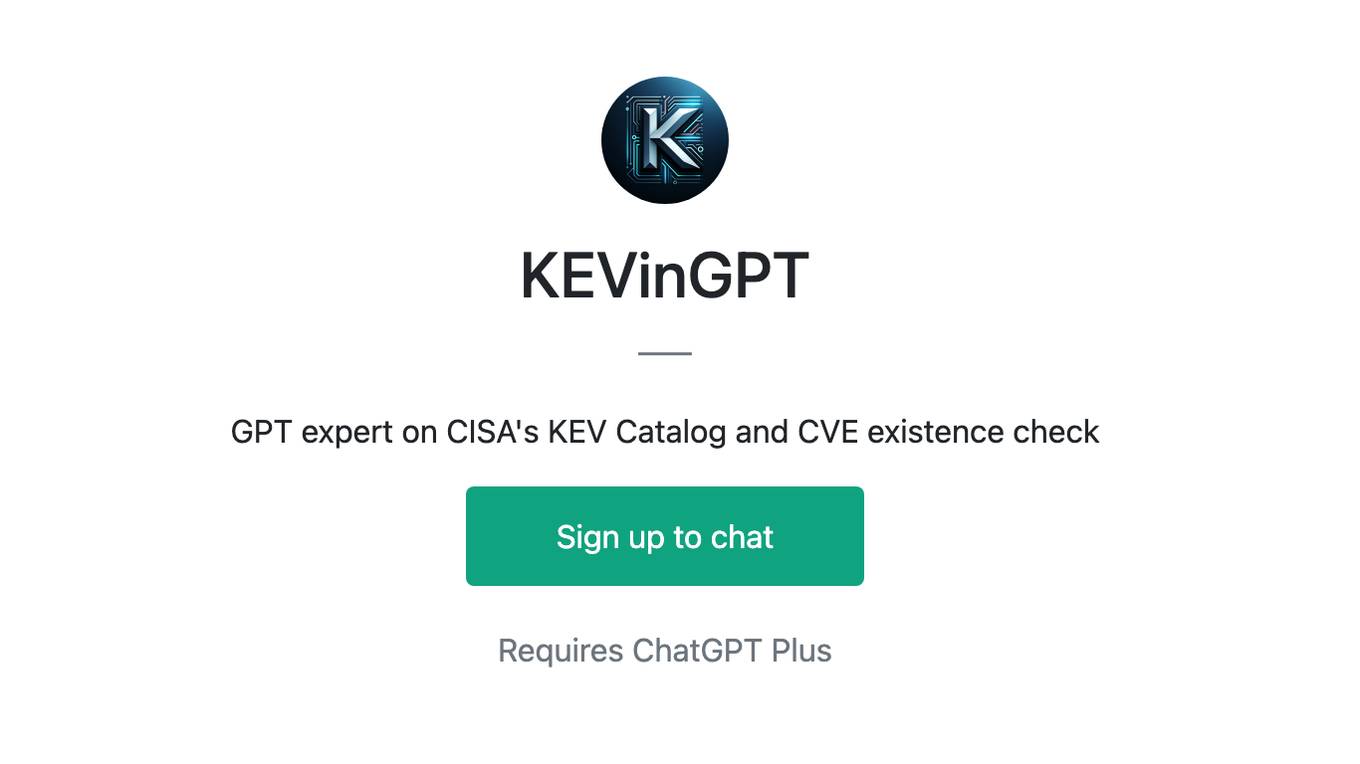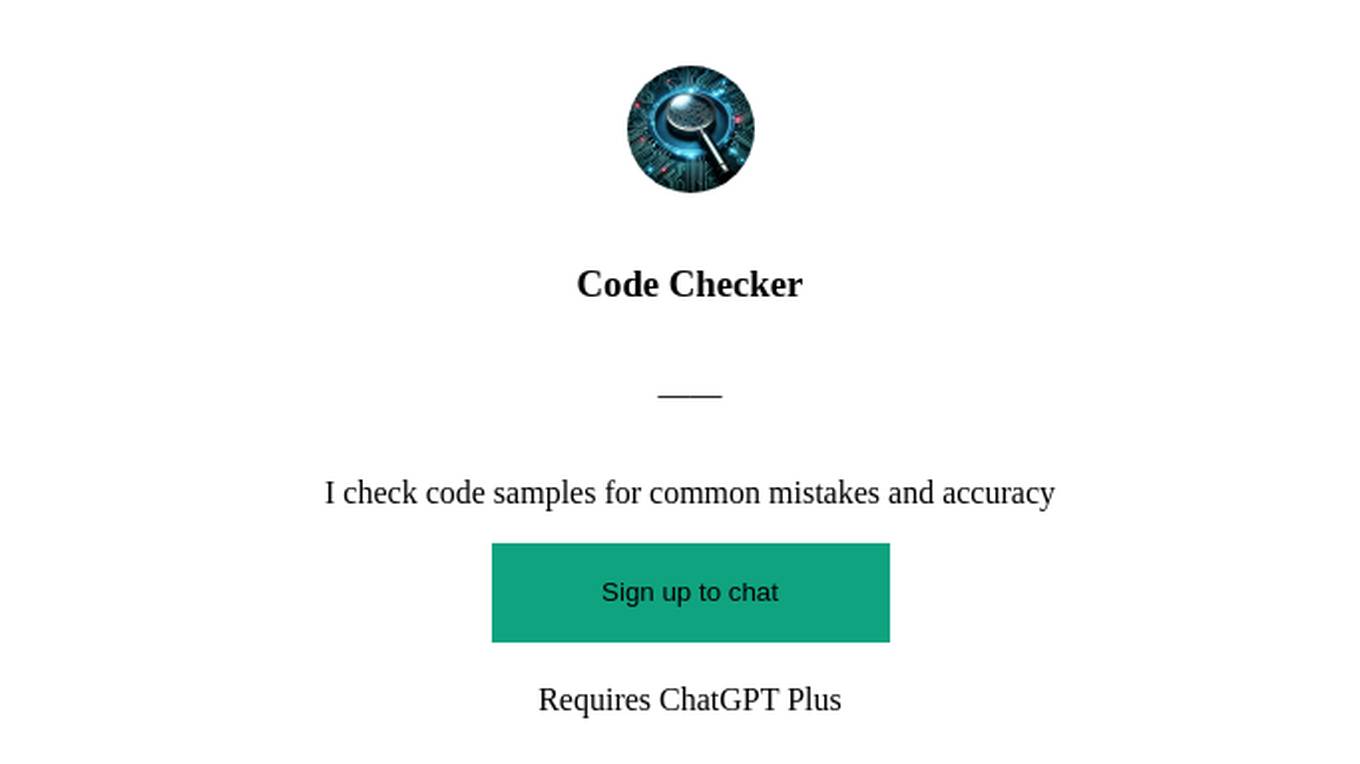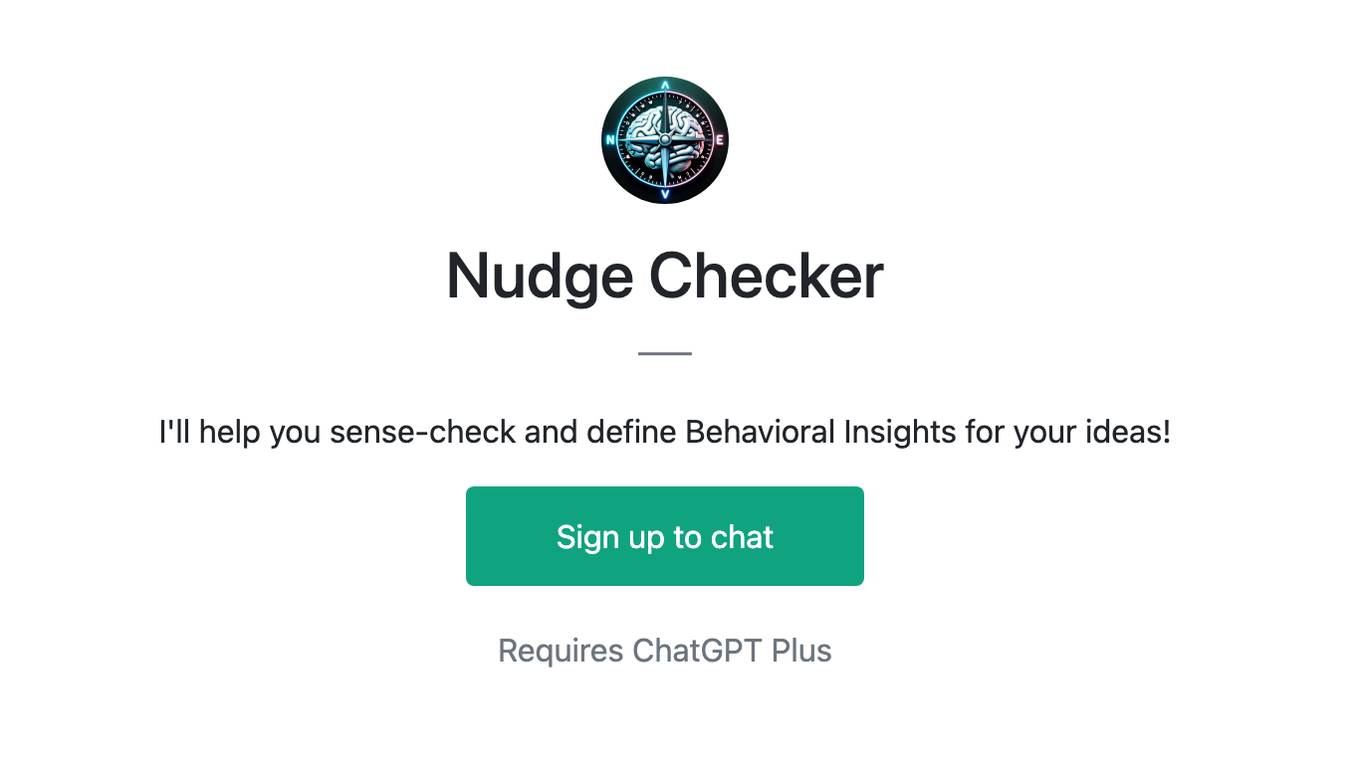Best AI tools for< check deployment >
20 - AI tool Sites
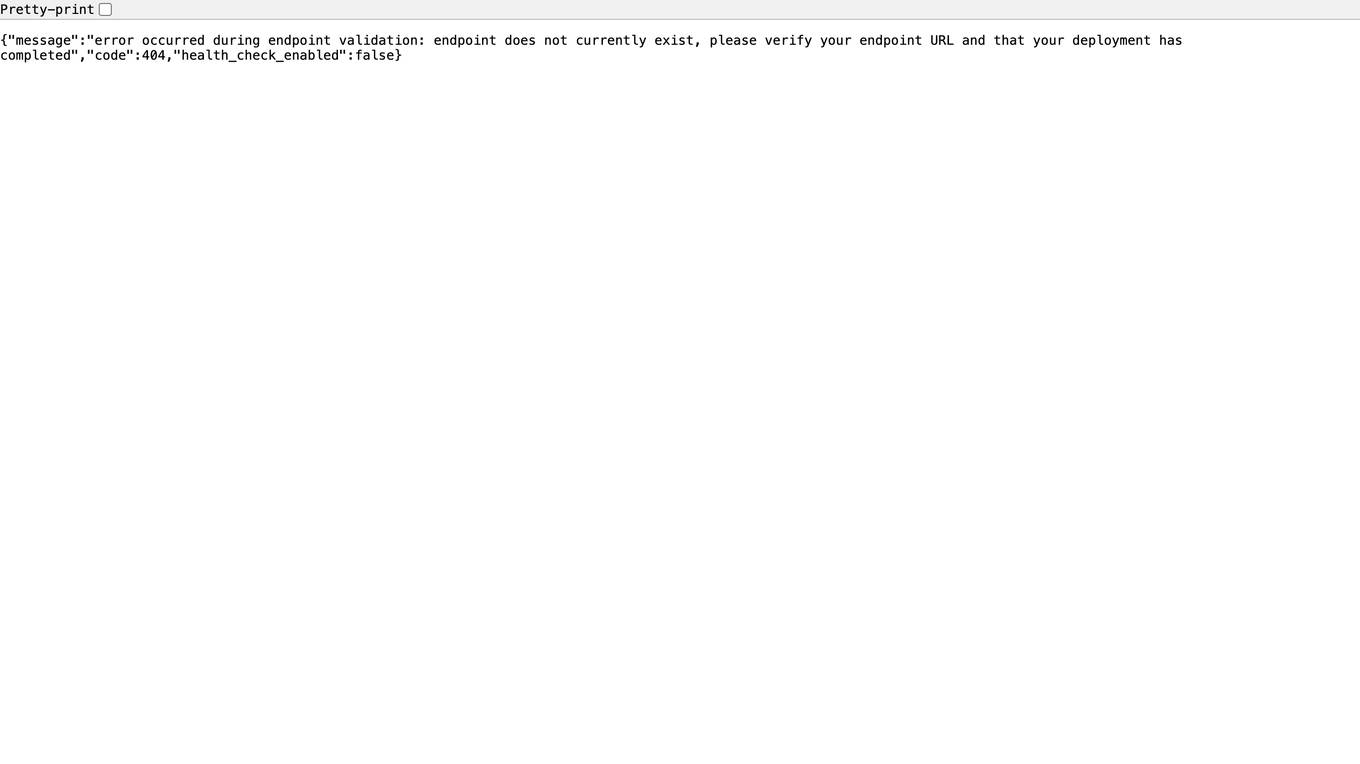
Endpoint Validator
The website is not an AI tool or application. It seems to be a platform where users can validate endpoints and check the status of their deployments. The site provides error messages related to endpoint validation, including code 404 and information about health check status.
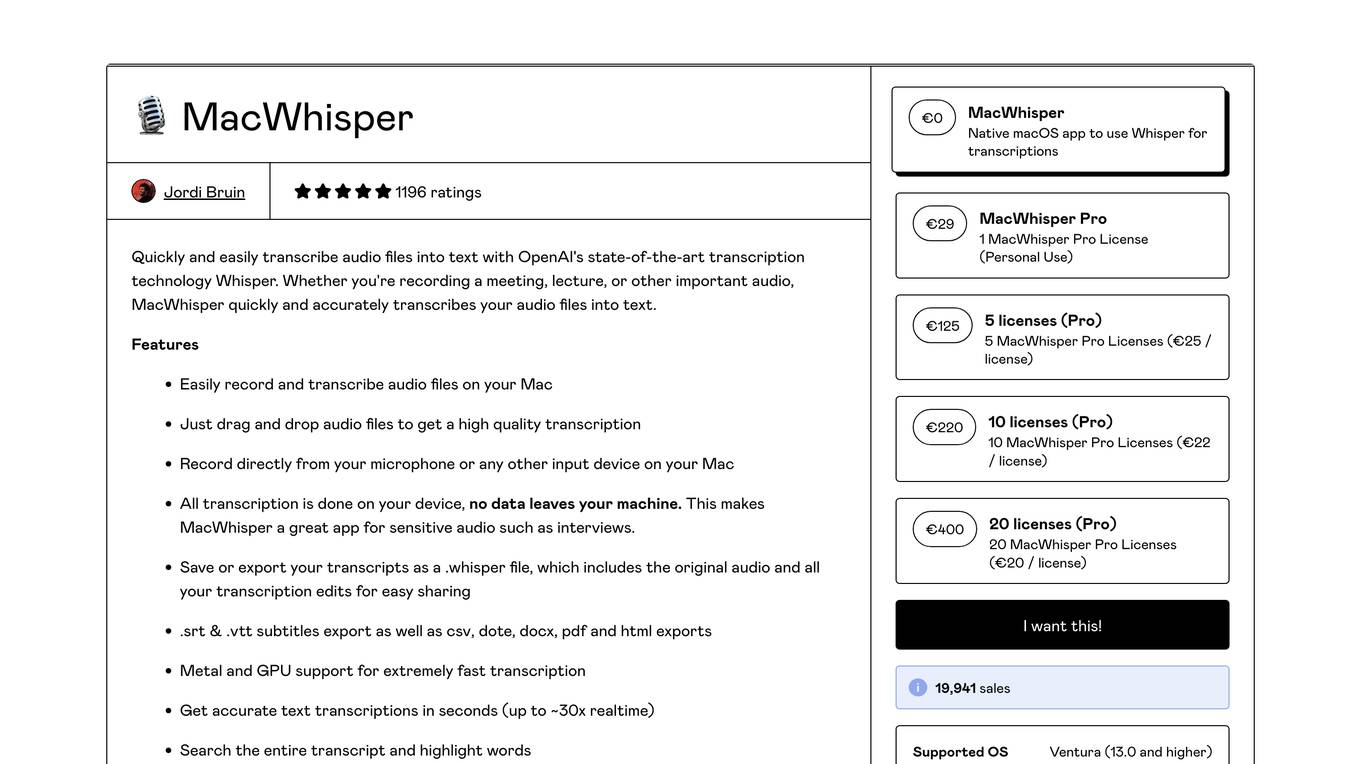
MacWhisper
MacWhisper is a native macOS application that utilizes OpenAI's Whisper technology for transcribing audio files into text. It offers a user-friendly interface for recording, transcribing, and editing audio, making it suitable for various use cases such as transcribing meetings, lectures, interviews, and podcasts. The application is designed to protect user privacy by performing all transcriptions locally on the device, ensuring that no data leaves the user's machine.
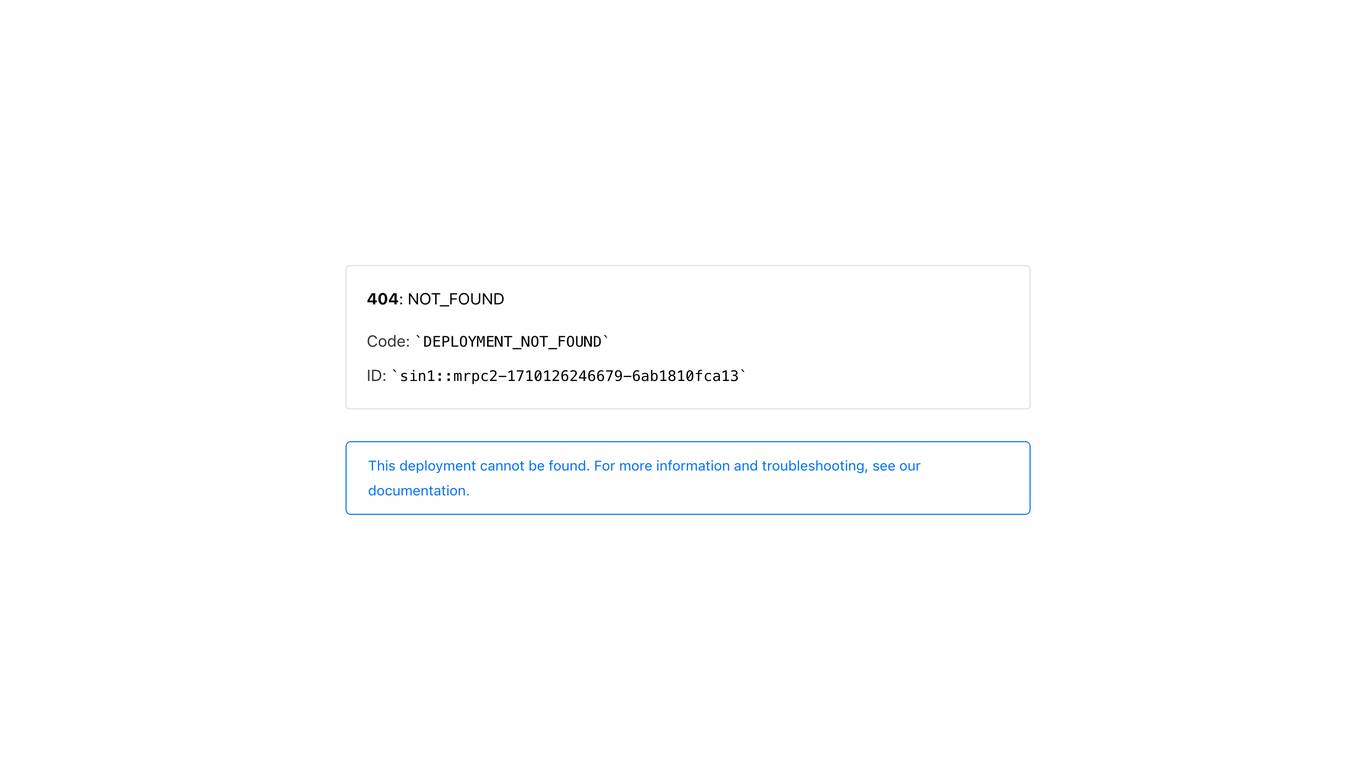
404 Error Notifier
The website displays a 404 error message indicating that the deployment cannot be found. It provides a code (DEPLOYMENT_NOT_FOUND) and an ID (sin1::6kcsd-1721411296297-b19b5db02f79) for reference. Users are directed to check the documentation for further information and troubleshooting.

N/A
The website displays a 402: PAYMENT_REQUIRED error message indicating that the deployment has been disabled. It suggests checking the connection and Vercel status. The error code is DEPLOYMENT_DISABLED with an ID sin1::dxbns-1722103310272-965718d60a17. Visitors are advised to contact the website owner or try again later, while owners are directed to the documentation section for further information.
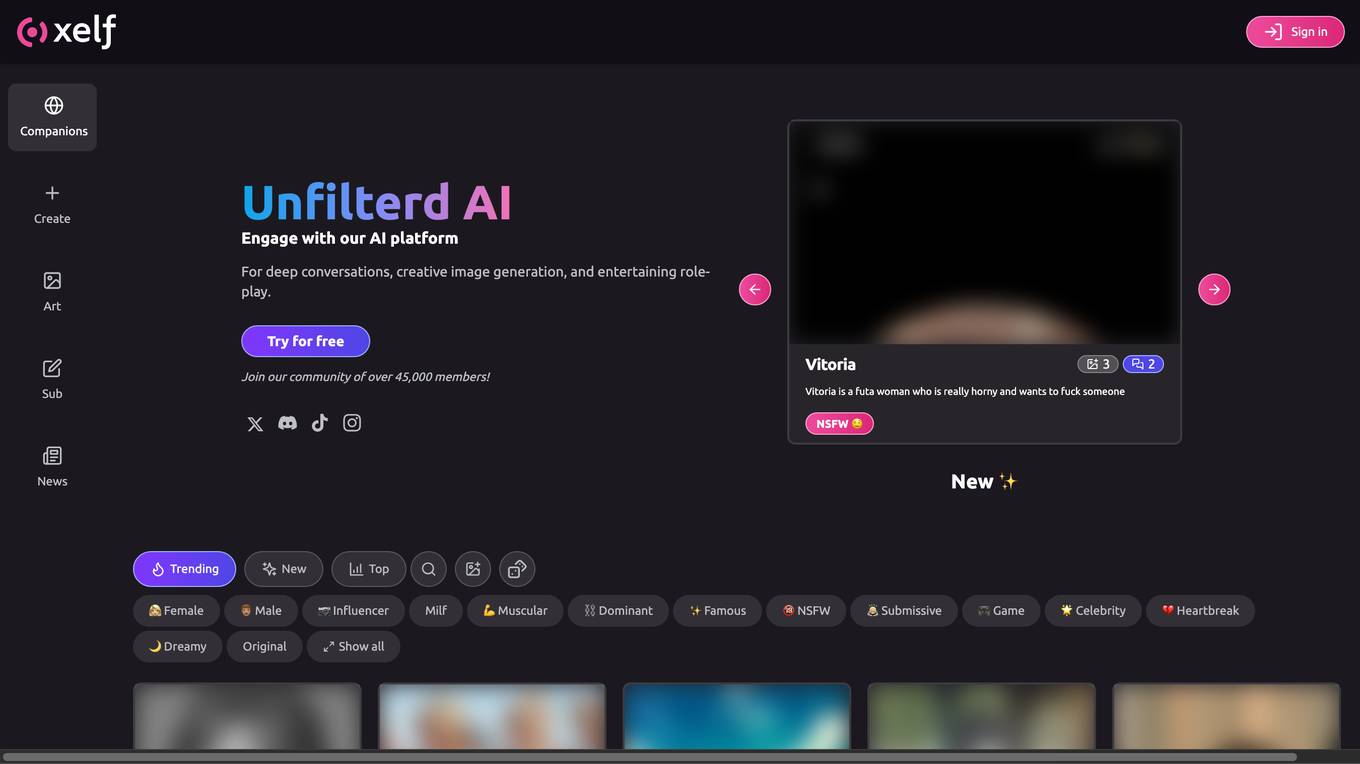
404 Error Page
The website displays a '404: NOT_FOUND' error message indicating that the deployment cannot be found. It provides a code (DEPLOYMENT_NOT_FOUND) and an ID (sin1::22md2-1720772812453-4893618e160a) for reference. Users are directed to check the documentation for further information and troubleshooting.
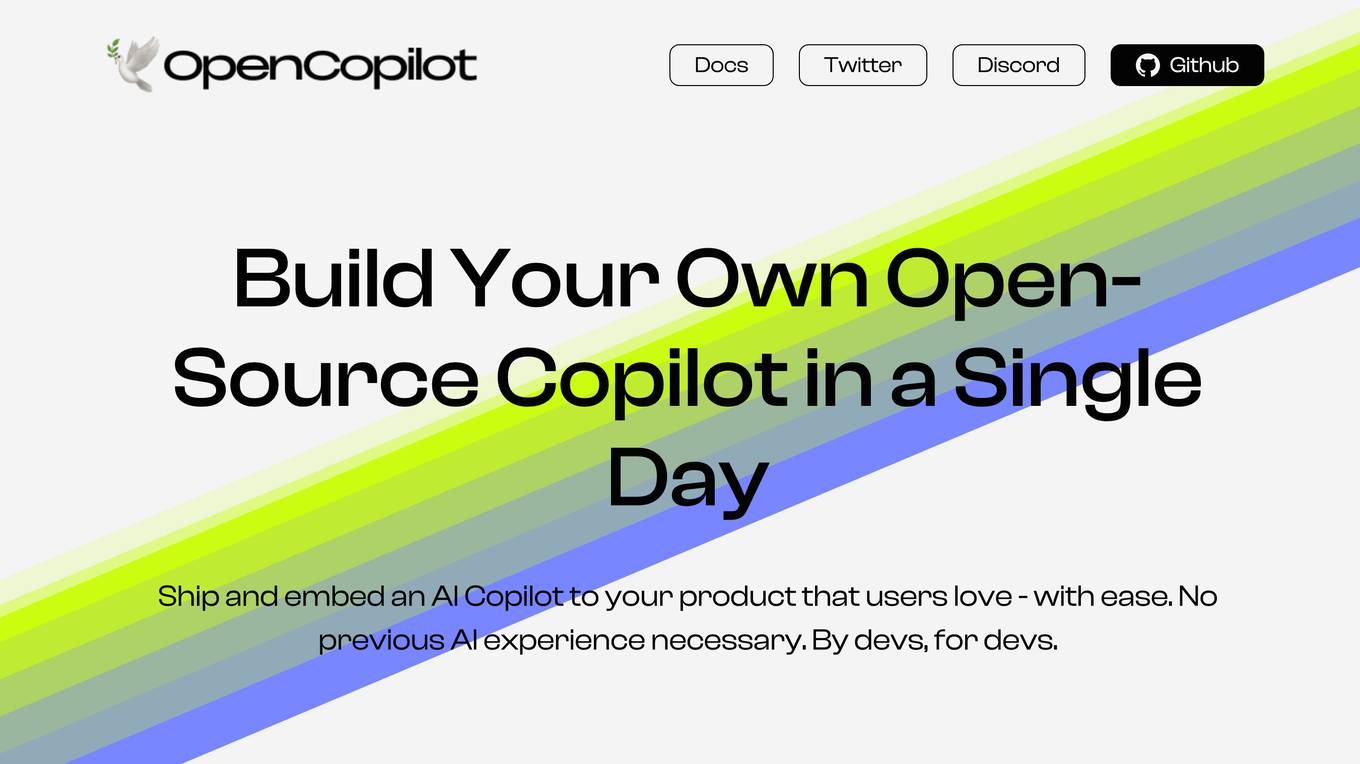
404 Error Page
The website displays a 404 error message indicating that the deployment cannot be found. It provides a code (DEPLOYMENT_NOT_FOUND) and an ID (sin1::72lf6-1720289883339-9c02f9882128) for reference. Users are directed to check the documentation for further information and troubleshooting.
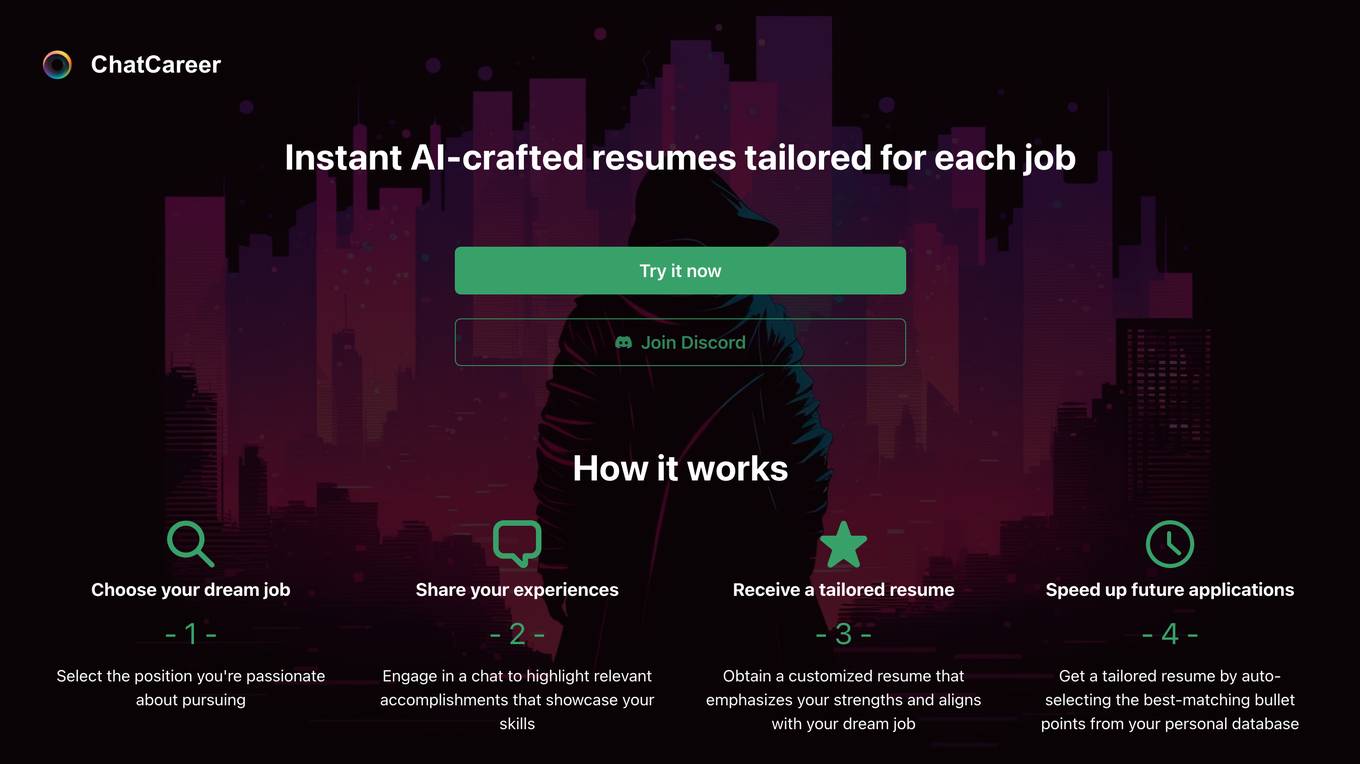
404 Error Page
The website displays a 404 error message indicating that the deployment cannot be found. It provides a code (DEPLOYMENT_NOT_FOUND) and an ID (sin1::7crbp-1720289011850-d12041b250e9) for reference. Users are directed to check the documentation for further information and troubleshooting.
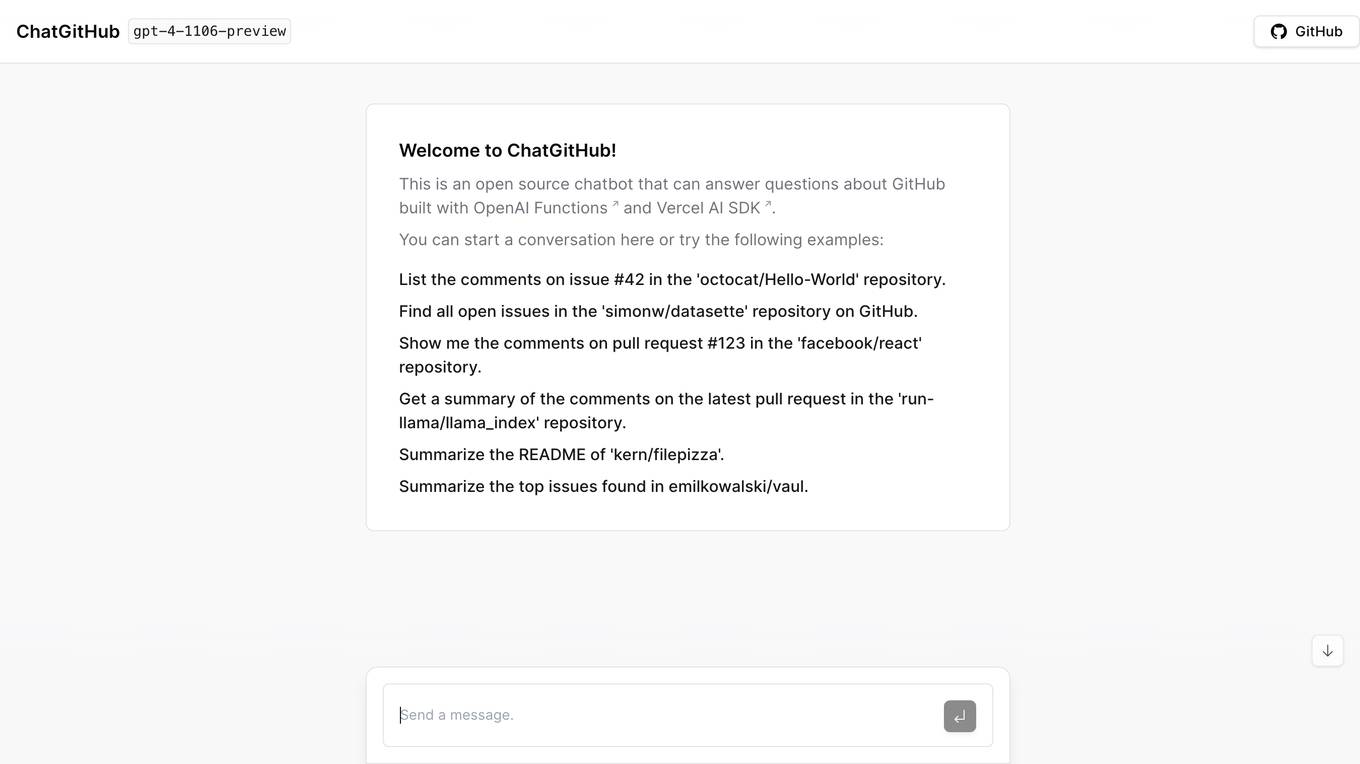
404 Error Page
The website displays a '404: NOT_FOUND' error message indicating that the deployment cannot be found. It provides a code (DEPLOYMENT_NOT_FOUND) and an ID (sin1::hs4tn-1722621900097-e40e9532545e) for reference. Users are directed to check the documentation for further information and troubleshooting.
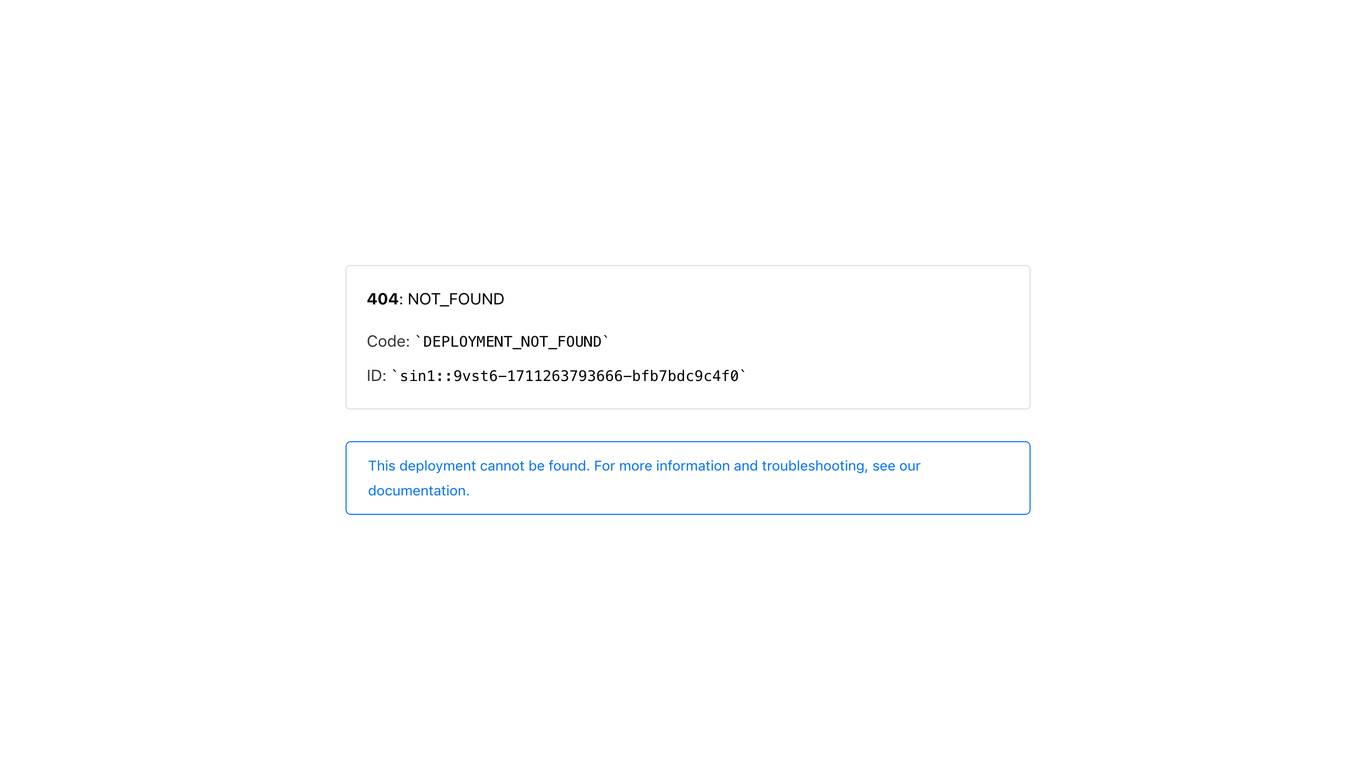
404 Error Finder
The website displays a 404 error message indicating that the deployment cannot be found. It provides a code (DEPLOYMENT_NOT_FOUND) and an ID (sin1::pqrt6-1722102633900-73894a638191) for reference. Users are directed to check the documentation for further information and troubleshooting.

404 Error Page
The website displays a 404 error message indicating that the deployment cannot be found. It provides a code (DEPLOYMENT_NOT_FOUND) and an ID (sin1::qb7zl-1722620992318-b7d1da837ce4) for reference. Users are directed to check the documentation for further information and troubleshooting.

404 Error Page
The website displays a '404: NOT_FOUND' error message indicating that the deployment cannot be found. It provides a code (DEPLOYMENT_NOT_FOUND) and an ID (sin1::559x4-1720980734526-08cf471c3725) for reference. Users are directed to check the documentation for further information and troubleshooting.

404 Error Assistant
The website displays a 404 error message indicating that the deployment cannot be found. It provides a code (DEPLOYMENT_NOT_FOUND) and an ID (sin1::mn2xw-1722103808472-8f7ce719fc65) for reference. Users are directed to check the documentation for further information and troubleshooting.
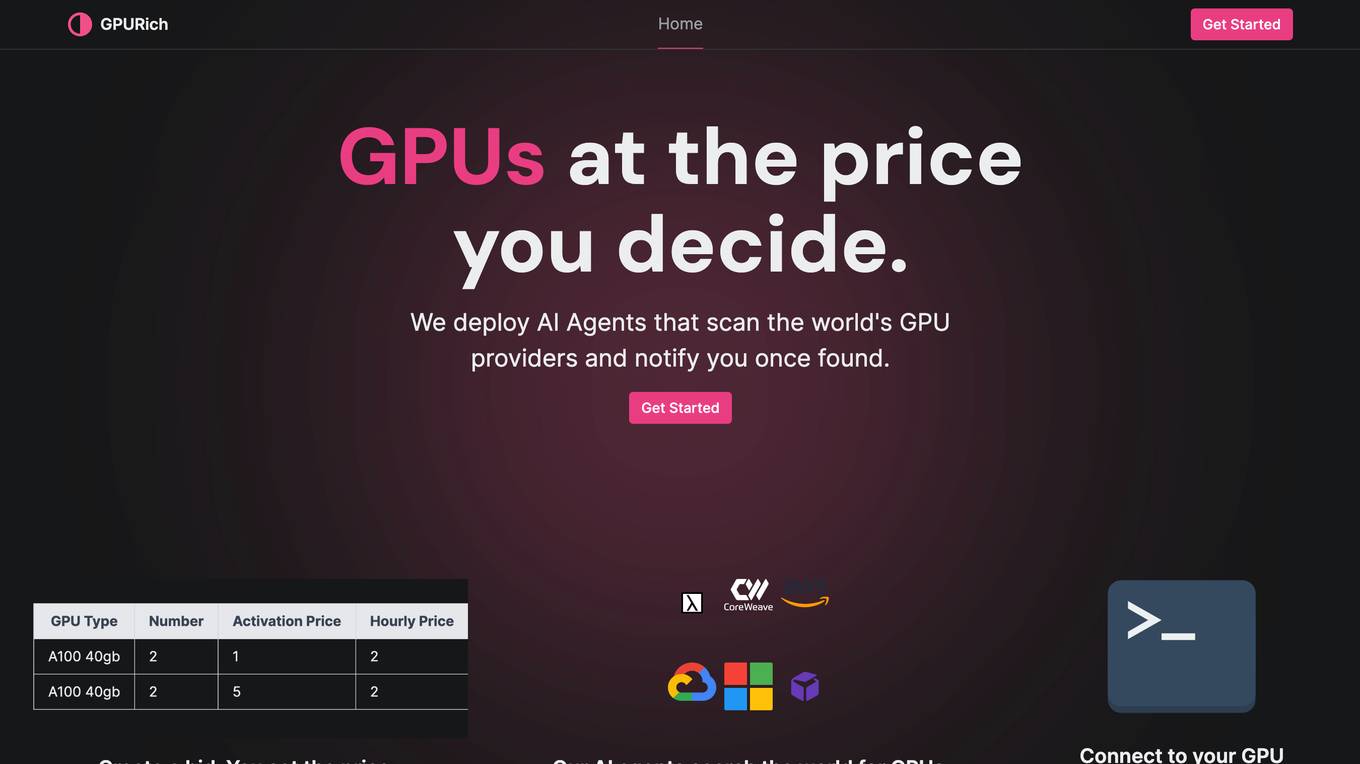
404 Error Page
The website displays a 404 error message indicating that the deployment cannot be found. It provides a code (DEPLOYMENT_NOT_FOUND) and an ID (sin1::gfnl6-1721325222494-b633dc463c21) for reference. Users are directed to check the documentation for further information and troubleshooting.
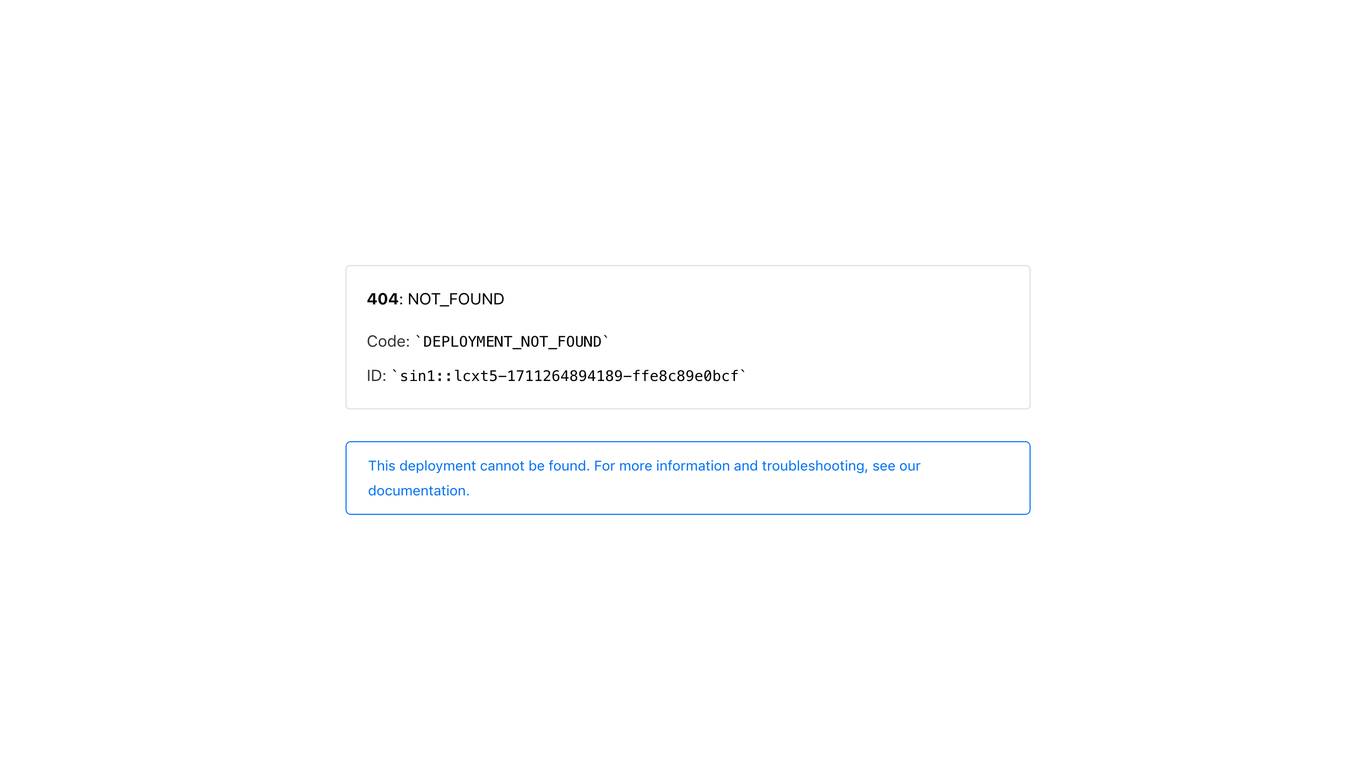
404 Error Page
The website displays a 404 error message indicating that the deployment cannot be found. It provides a code (DEPLOYMENT_NOT_FOUND) and an ID (sin1::6d952-1722103728261-729d34a57a29) for reference. Users are directed to check the documentation for further information and troubleshooting.
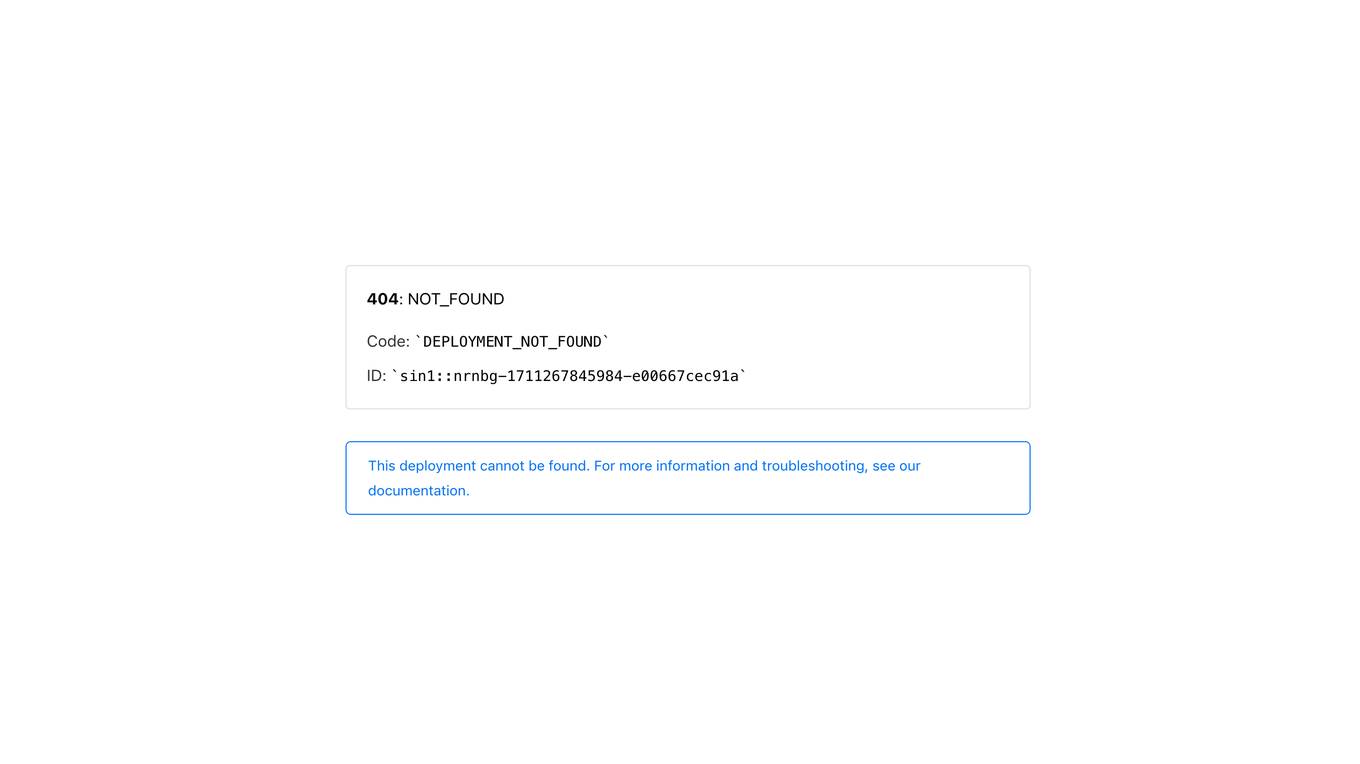
404 Error Page
The website displays a 404 error message indicating that the deployment cannot be found. It provides a code and an ID for reference, along with a suggestion to check the documentation for more information and troubleshooting.
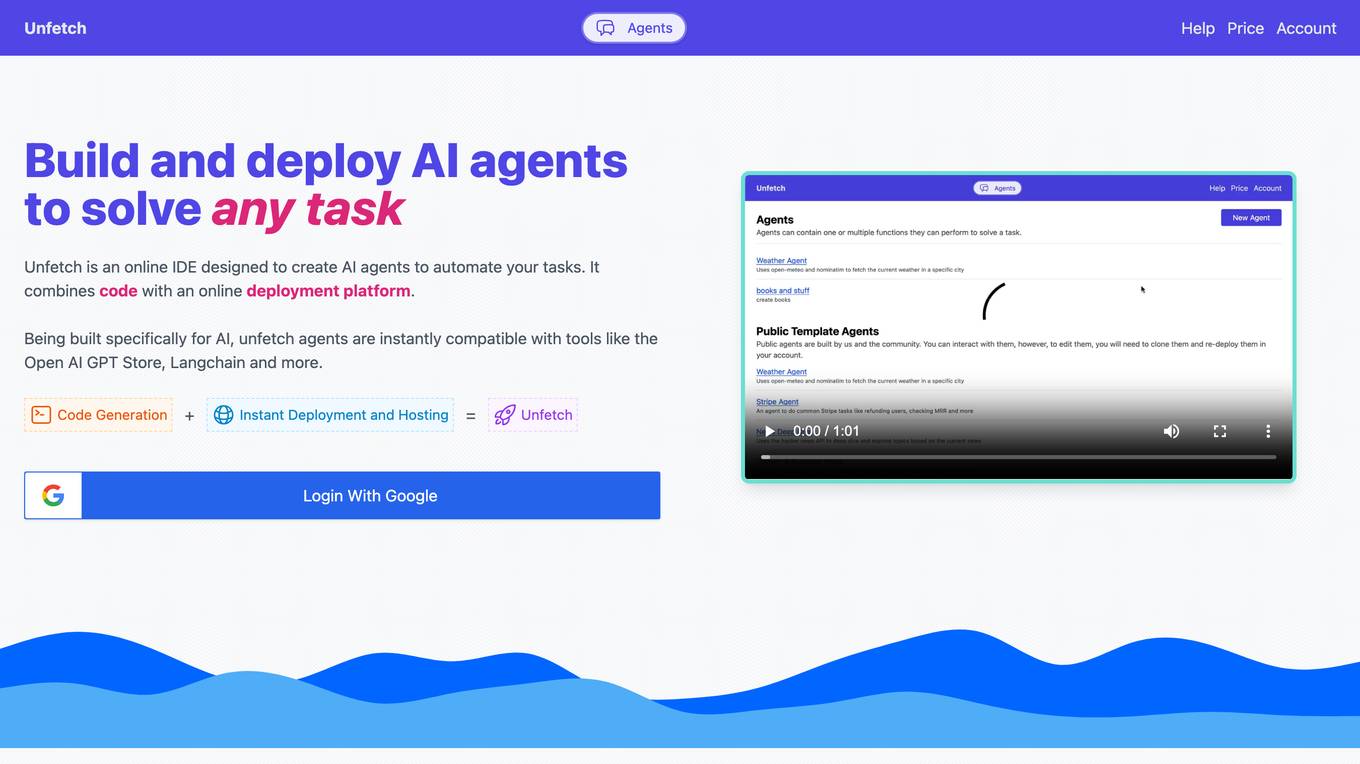
Unfetch
Unfetch is an online IDE that allows users to generate, deploy, and run AI agents to automate tasks. It combines code creation with an online deployment platform, making it easy to build and deploy AI agents quickly. Unfetch agents are designed specifically for AI tasks and are compatible with tools like Open AI GPT Store and Langchain. Users can create custom AI agents or clone ready-made examples to streamline tasks and processes.
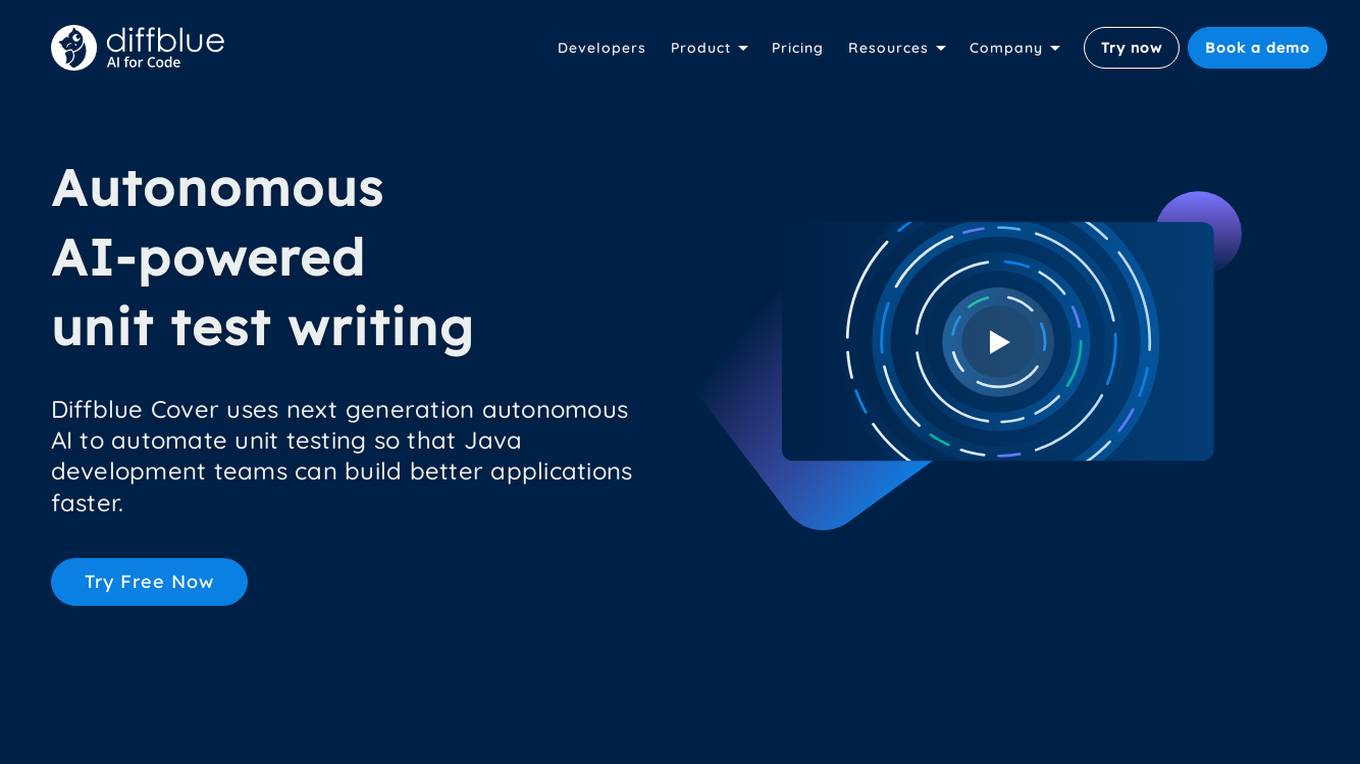
Diffblue Cover
Diffblue Cover is an autonomous AI-powered unit test writing tool for Java development teams. It uses next-generation autonomous AI to automate unit testing, freeing up developers to focus on more creative work. Diffblue Cover can write a complete and correct Java unit test every 2 seconds, and it is directly integrated into CI pipelines, unlike AI-powered code suggestions that require developers to check the code for bugs. Diffblue Cover is trusted by the world's leading organizations, including Goldman Sachs, and has been proven to improve quality, lower developer effort, help with code understanding, reduce risk, and increase deployment frequency.

Tangram Vision
Tangram Vision is a company that provides sensor calibration tools and infrastructure for robotics and autonomous vehicles. Their products include MetriCal, a high-speed bundle adjustment software for precise sensor calibration, and AutoCal, an on-device, real-time calibration health check and adjustment tool. Tangram Vision also offers a high-resolution depth sensor called HiFi, which combines high-resolution depth data with high-powered AI capabilities. The company's mission is to accelerate the development and deployment of autonomous systems by providing the tools and infrastructure needed to ensure the accuracy and reliability of sensors.
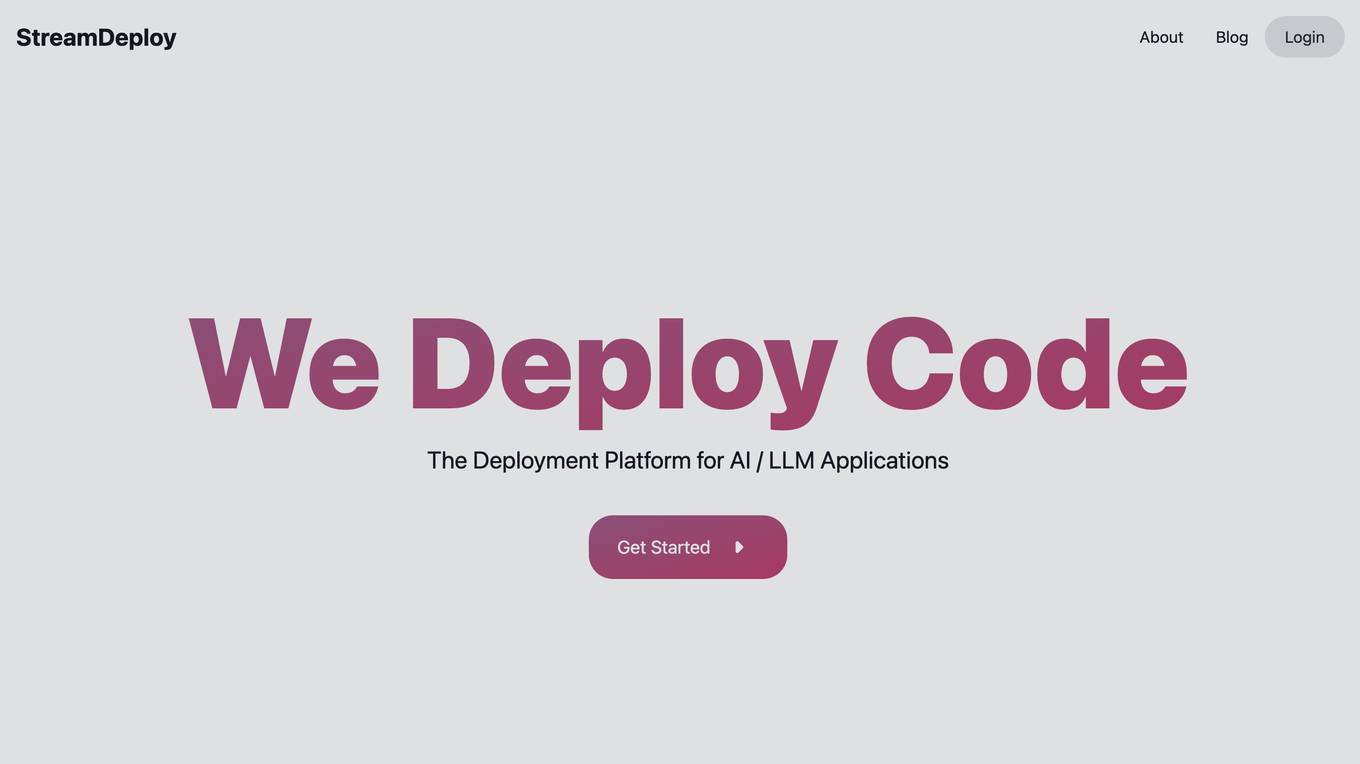
StreamDeploy
StreamDeploy is an AI-powered cloud deployment platform designed to streamline and secure application deployment for agile teams. It offers a range of features to help developers maximize productivity and minimize costs, including a Dockerfile generator, automated security checks, and support for continuous integration and delivery (CI/CD) pipelines. StreamDeploy is currently in closed beta, but interested users can book a demo or follow the company on Twitter for updates.
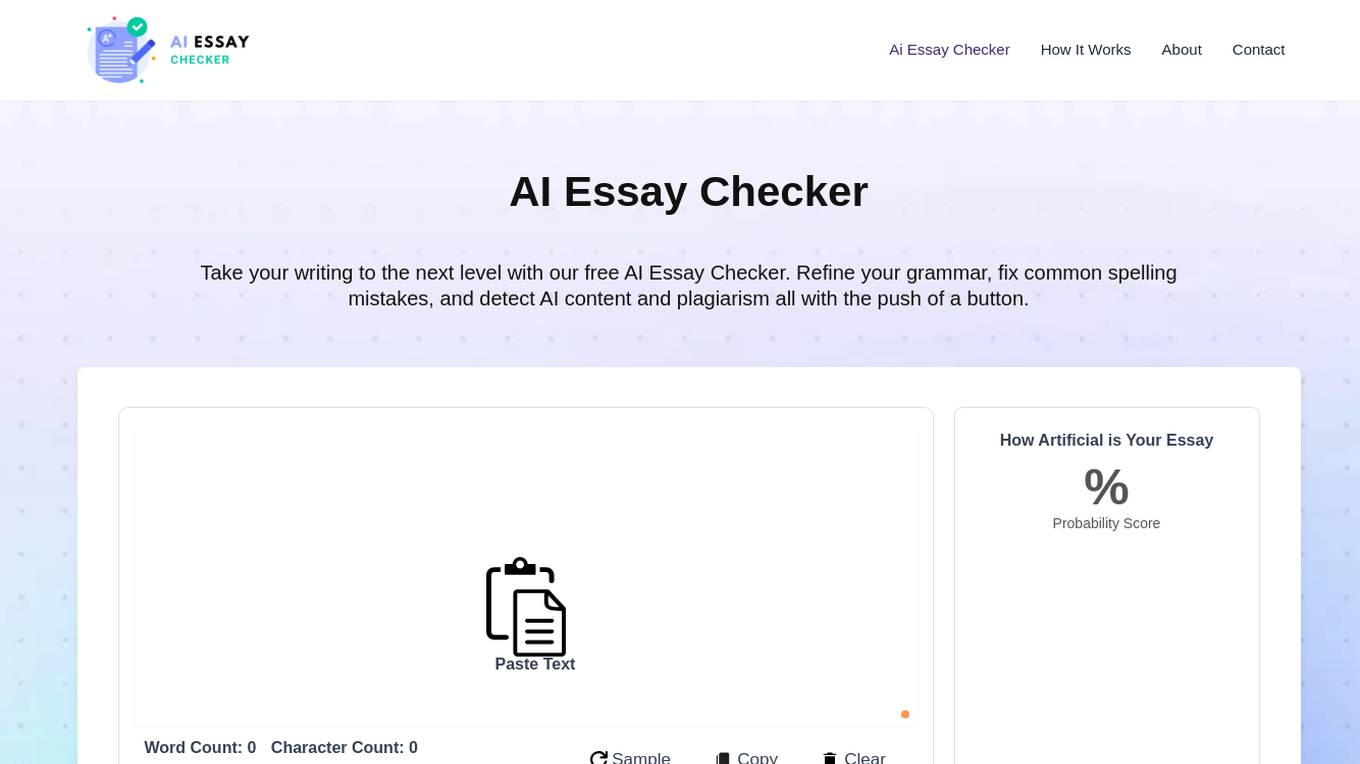
Essay Check
Essay Check is a free AI-powered tool that helps students, teachers, content creators, SEO specialists, and legal experts refine their writing, detect plagiarism, and identify AI-generated content. With its user-friendly interface and advanced algorithms, Essay Check analyzes text to identify grammatical errors, spelling mistakes, instances of plagiarism, and the likelihood that content was written using AI. The tool provides detailed feedback and suggestions to help users improve their writing and ensure its originality and authenticity.
20 - Open Source AI Tools
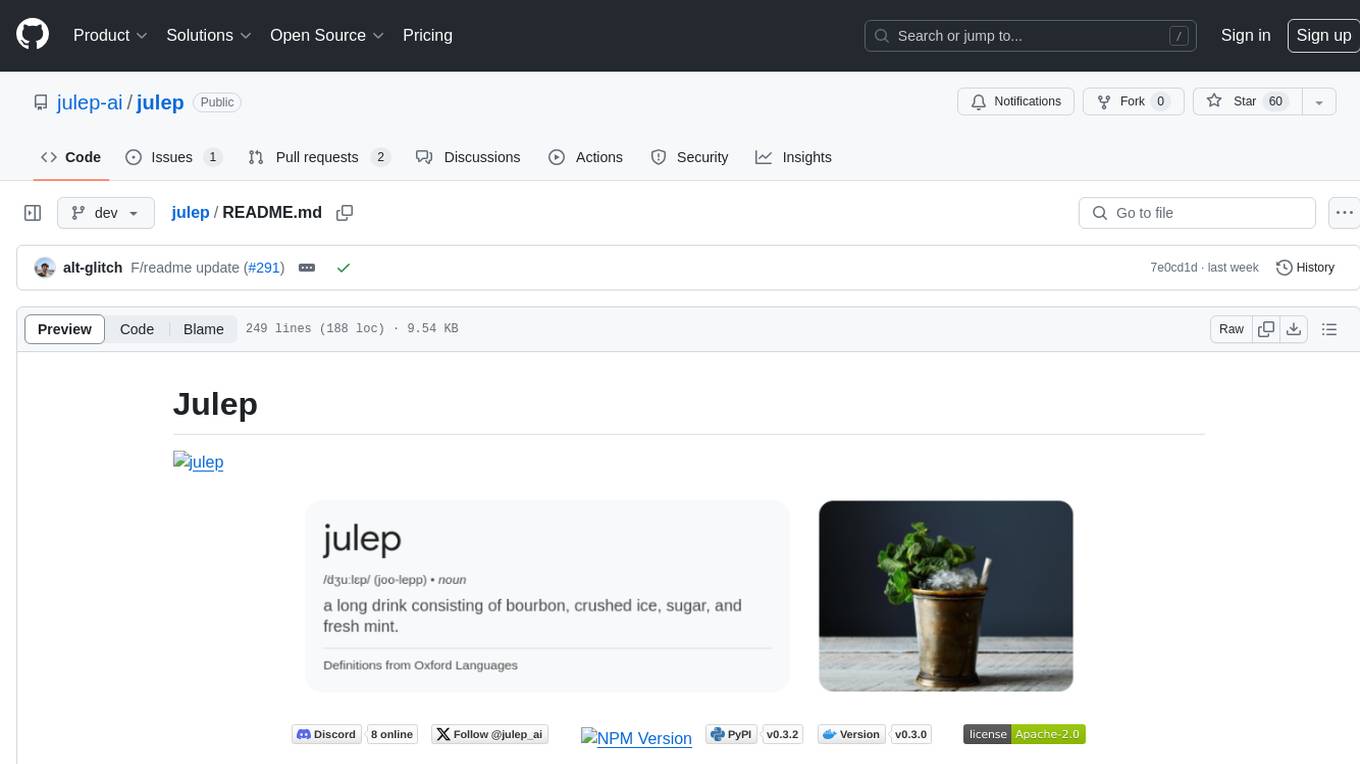
julep
Julep is an advanced platform for creating stateful and functional AI apps powered by large language models. It offers features like statefulness by design, automatic function calling, production-ready deployment, cron-like asynchronous functions, 90+ built-in tools, and the ability to switch between different LLMs easily. Users can build AI applications without the need to write code for embedding, saving, and retrieving conversation history, and can connect to third-party applications using Composio. Julep simplifies the process of getting started with AI apps, whether they are conversational, functional, or agentic.
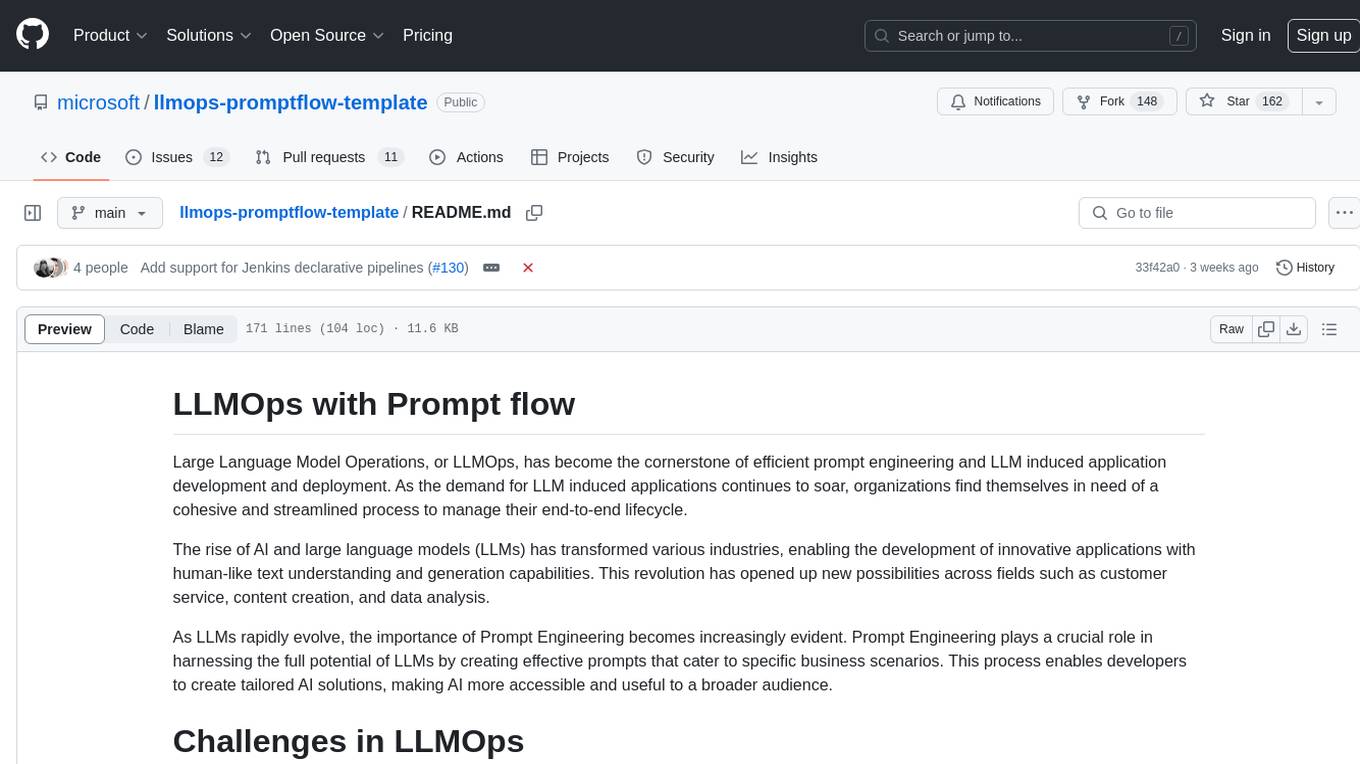
llmops-promptflow-template
LLMOps with Prompt flow is a template and guidance for building LLM-infused apps using Prompt flow. It provides centralized code hosting, lifecycle management, variant and hyperparameter experimentation, A/B deployment, many-to-many dataset/flow relationships, multiple deployment targets, comprehensive reporting, BYOF capabilities, configuration-based development, local prompt experimentation and evaluation, endpoint testing, and optional Human-in-loop validation. The tool is customizable to suit various application needs.
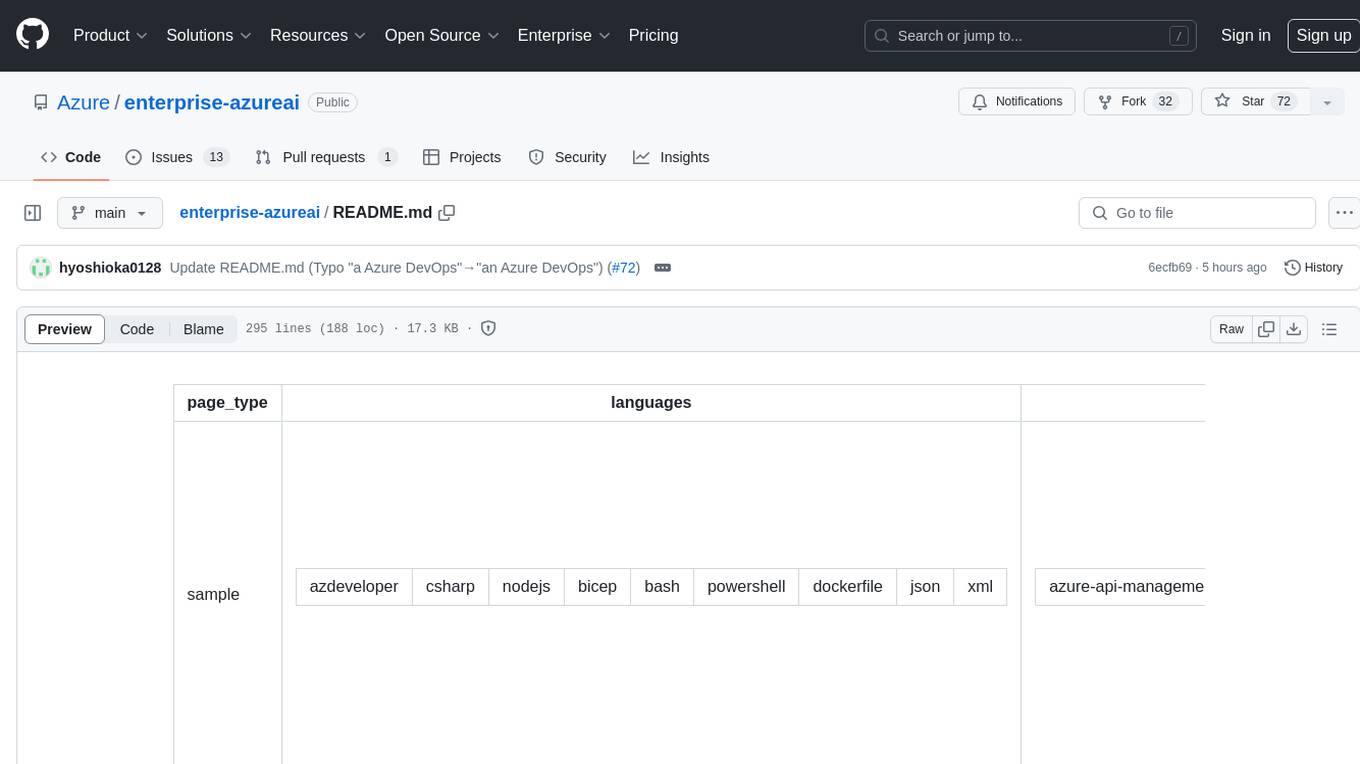
enterprise-azureai
Azure OpenAI Service is a central capability with Azure API Management, providing guidance and tools for organizations to implement Azure OpenAI in a production environment with an emphasis on cost control, secure access, and usage monitoring. It includes infrastructure-as-code templates, CI/CD pipelines, secure access management, usage monitoring, load balancing, streaming requests, and end-to-end samples like ChatApp and Azure Dashboards.
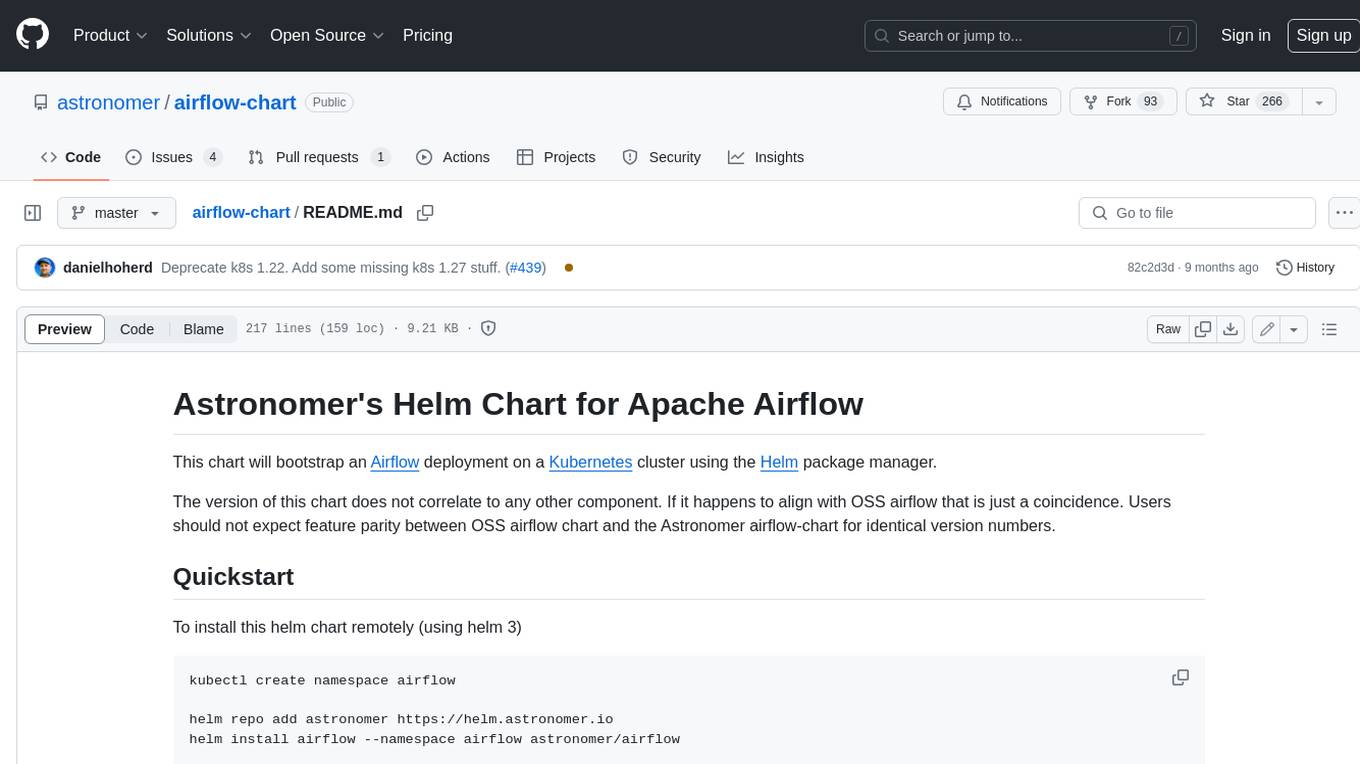
airflow-chart
This Helm chart bootstraps an Airflow deployment on a Kubernetes cluster using the Helm package manager. The version of this chart does not correlate to any other component. Users should not expect feature parity between OSS airflow chart and the Astronomer airflow-chart for identical version numbers. To install this helm chart remotely (using helm 3) kubectl create namespace airflow helm repo add astronomer https://helm.astronomer.io helm install airflow --namespace airflow astronomer/airflow To install this repository from source sh kubectl create namespace airflow helm install --namespace airflow . Prerequisites: Kubernetes 1.12+ Helm 3.6+ PV provisioner support in the underlying infrastructure Installing the Chart: sh helm install --name my-release . The command deploys Airflow on the Kubernetes cluster in the default configuration. The Parameters section lists the parameters that can be configured during installation. Upgrading the Chart: First, look at the updating documentation to identify any backwards-incompatible changes. To upgrade the chart with the release name `my-release`: sh helm upgrade --name my-release . Uninstalling the Chart: To uninstall/delete the `my-release` deployment: sh helm delete my-release The command removes all the Kubernetes components associated with the chart and deletes the release. Updating DAGs: Bake DAGs in Docker image The recommended way to update your DAGs with this chart is to build a new docker image with the latest code (`docker build -t my-company/airflow:8a0da78 .`), push it to an accessible registry (`docker push my-company/airflow:8a0da78`), then update the Airflow pods with that image: sh helm upgrade my-release . --set images.airflow.repository=my-company/airflow --set images.airflow.tag=8a0da78 Docker Images: The Airflow image that are referenced as the default values in this chart are generated from this repository: https://github.com/astronomer/ap-airflow. Other non-airflow images used in this chart are generated from this repository: https://github.com/astronomer/ap-vendor. Parameters: The complete list of parameters supported by the community chart can be found on the Parameteres Reference page, and can be set under the `airflow` key in this chart. The following tables lists the configurable parameters of the Astronomer chart and their default values. | Parameter | Description | Default | | :----------------------------- | :-------------------------------------------------------------------------------------------------------- | :---------------------------- | | `ingress.enabled` | Enable Kubernetes Ingress support | `false` | | `ingress.acme` | Add acme annotations to Ingress object | `false` | | `ingress.tlsSecretName` | Name of secret that contains a TLS secret | `~` | | `ingress.webserverAnnotations` | Annotations added to Webserver Ingress object | `{}` | | `ingress.flowerAnnotations` | Annotations added to Flower Ingress object | `{}` | | `ingress.baseDomain` | Base domain for VHOSTs | `~` | | `ingress.auth.enabled` | Enable auth with Astronomer Platform | `true` | | `extraObjects` | Extra K8s Objects to deploy (these are passed through `tpl`). More about Extra Objects. | `[]` | | `sccEnabled` | Enable security context constraints required for OpenShift | `false` | | `authSidecar.enabled` | Enable authSidecar | `false` | | `authSidecar.repository` | The image for the auth sidecar proxy | `nginxinc/nginx-unprivileged` | | `authSidecar.tag` | The image tag for the auth sidecar proxy | `stable` | | `authSidecar.pullPolicy` | The K8s pullPolicy for the the auth sidecar proxy image | `IfNotPresent` | | `authSidecar.port` | The port the auth sidecar exposes | `8084` | | `gitSyncRelay.enabled` | Enables git sync relay feature. | `False` | | `gitSyncRelay.repo.url` | Upstream URL to the git repo to clone. | `~` | | `gitSyncRelay.repo.branch` | Branch of the upstream git repo to checkout. | `main` | | `gitSyncRelay.repo.depth` | How many revisions to check out. Leave as default `1` except in dev where history is needed. | `1` | | `gitSyncRelay.repo.wait` | Seconds to wait before pulling from the upstream remote. | `60` | | `gitSyncRelay.repo.subPath` | Path to the dags directory within the git repository. | `~` | Specify each parameter using the `--set key=value[,key=value]` argument to `helm install`. For example, sh helm install --name my-release --set executor=CeleryExecutor --set enablePodLaunching=false . Walkthrough using kind: Install kind, and create a cluster We recommend testing with Kubernetes 1.25+, example: sh kind create cluster --image kindest/node:v1.25.11 Confirm it's up: sh kubectl cluster-info --context kind-kind Add Astronomer's Helm repo sh helm repo add astronomer https://helm.astronomer.io helm repo update Create namespace + install the chart sh kubectl create namespace airflow helm install airflow -n airflow astronomer/airflow It may take a few minutes. Confirm the pods are up: sh kubectl get pods --all-namespaces helm list -n airflow Run `kubectl port-forward svc/airflow-webserver 8080:8080 -n airflow` to port-forward the Airflow UI to http://localhost:8080/ to confirm Airflow is working. Login as _admin_ and password _admin_. Build a Docker image from your DAGs: 1. Start a project using astro-cli, which will generate a Dockerfile, and load your DAGs in. You can test locally before pushing to kind with `astro airflow start`. `sh mkdir my-airflow-project && cd my-airflow-project astro dev init` 2. Then build the image: `sh docker build -t my-dags:0.0.1 .` 3. Load the image into kind: `sh kind load docker-image my-dags:0.0.1` 4. Upgrade Helm deployment: sh helm upgrade airflow -n airflow --set images.airflow.repository=my-dags --set images.airflow.tag=0.0.1 astronomer/airflow Extra Objects: This chart can deploy extra Kubernetes objects (assuming the role used by Helm can manage them). For Astronomer Cloud and Enterprise, the role permissions can be found in the Commander role. yaml extraObjects: - apiVersion: batch/v1beta1 kind: CronJob metadata: name: "{{ .Release.Name }}-somejob" spec: schedule: "*/10 * * * *" concurrencyPolicy: Forbid jobTemplate: spec: template: spec: containers: - name: myjob image: ubuntu command: - echo args: - hello restartPolicy: OnFailure Contributing: Check out our contributing guide! License: Apache 2.0 with Commons Clause
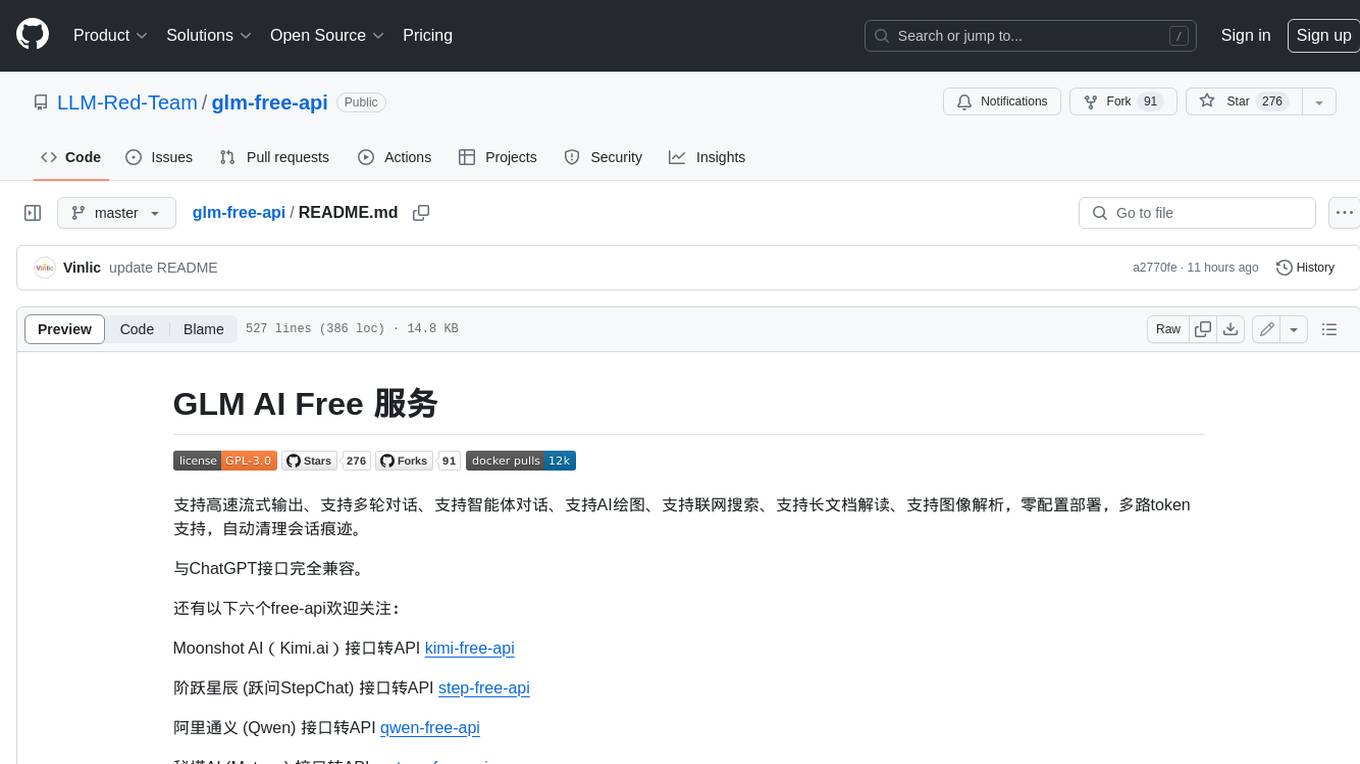
glm-free-api
GLM AI Free 服务 provides high-speed streaming output, multi-turn dialogue support, intelligent agent dialogue support, AI drawing support, online search support, long document interpretation support, image parsing support. It offers zero-configuration deployment, multi-token support, and automatic session trace cleaning. It is fully compatible with the ChatGPT interface. The repository also includes six other free APIs for various services like Moonshot AI, StepChat, Qwen, Metaso, Spark, and Emohaa. The tool supports tasks such as chat completions, AI drawing, document interpretation, image parsing, and refresh token survival check.
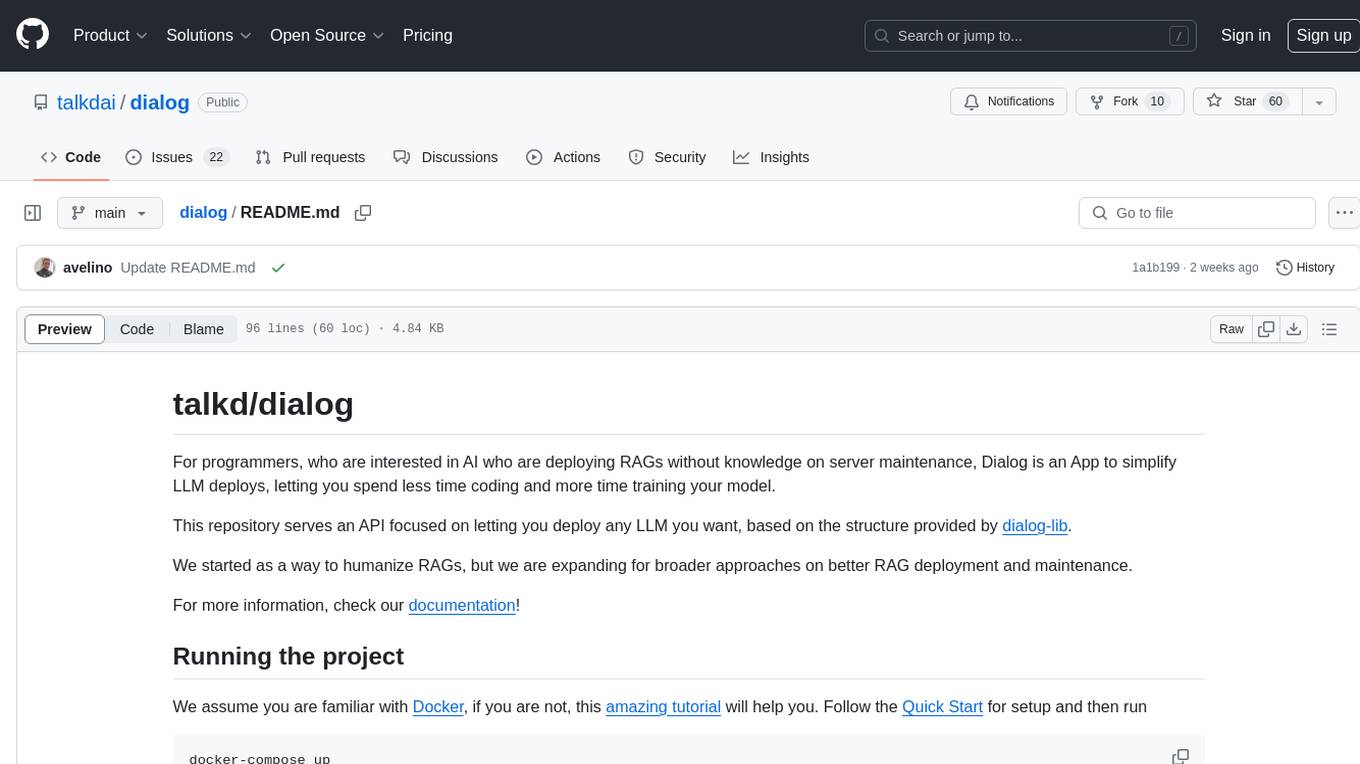
dialog
Dialog is an API-focused tool designed to simplify the deployment of Large Language Models (LLMs) for programmers interested in AI. It allows users to deploy any LLM based on the structure provided by dialog-lib, enabling them to spend less time coding and more time training their models. The tool aims to humanize Retrieval-Augmented Generative Models (RAGs) and offers features for better RAG deployment and maintenance. Dialog requires a knowledge base in CSV format and a prompt configuration in TOML format to function effectively. It provides functionalities for loading data into the database, processing conversations, and connecting to the LLM, with options to customize prompts and parameters. The tool also requires specific environment variables for setup and configuration.
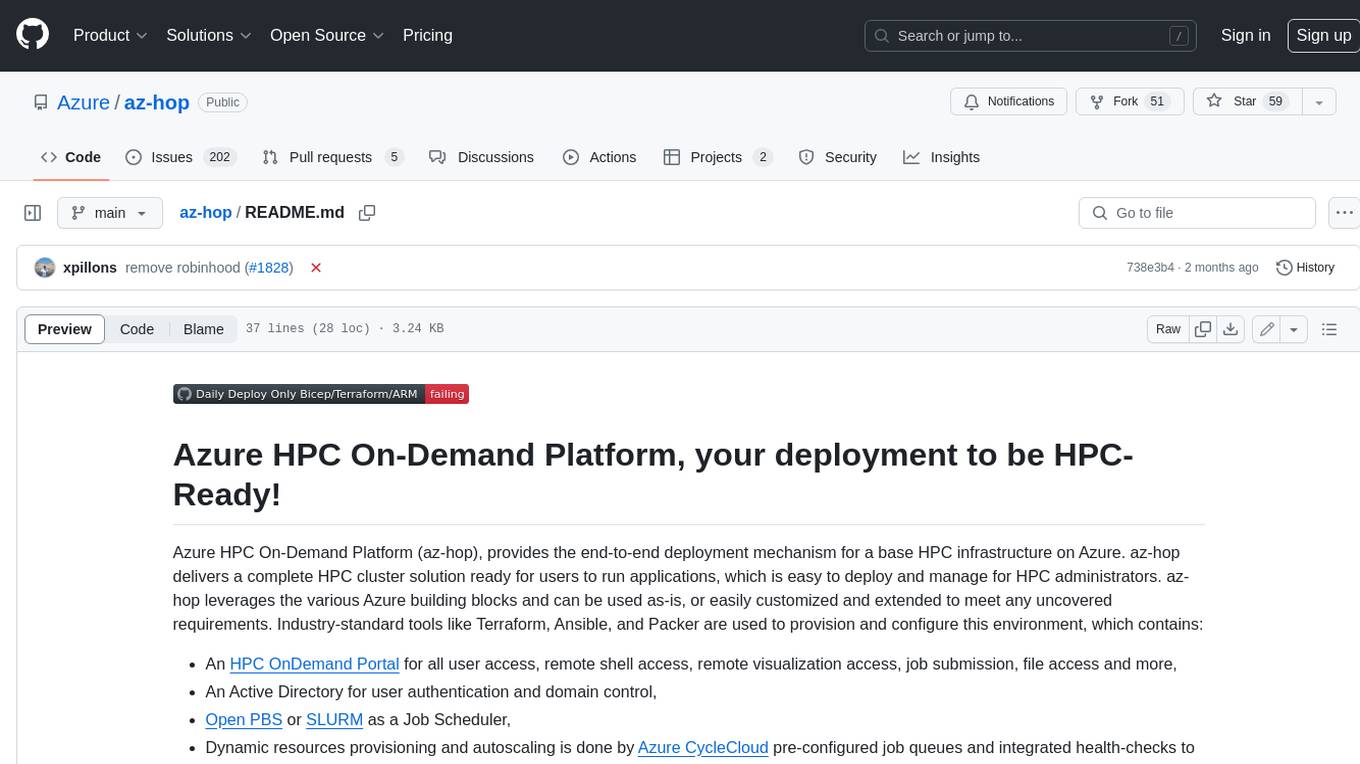
az-hop
Azure HPC On-Demand Platform (az-hop) provides an end-to-end deployment mechanism for a base HPC infrastructure on Azure. It delivers a complete HPC cluster solution ready for users to run applications, which is easy to deploy and manage for HPC administrators. az-hop leverages various Azure building blocks and can be used as-is or easily customized and extended to meet any uncovered requirements. Industry-standard tools like Terraform, Ansible, and Packer are used to provision and configure this environment, which contains: - An HPC OnDemand Portal for all user access, remote shell access, remote visualization access, job submission, file access, and more - An Active Directory for user authentication and domain control - Open PBS or SLURM as a Job Scheduler - Dynamic resources provisioning and autoscaling is done by Azure CycleCloud pre-configured job queues and integrated health-checks to quickly avoid non-optimal nodes - A Jumpbox to provide admin access - A common shared file system for home directory and applications is delivered by Azure Netapp Files - Grafana dashboards to monitor your cluster - Remote Visualization with noVNC and GPU acceleration with VirtualGL
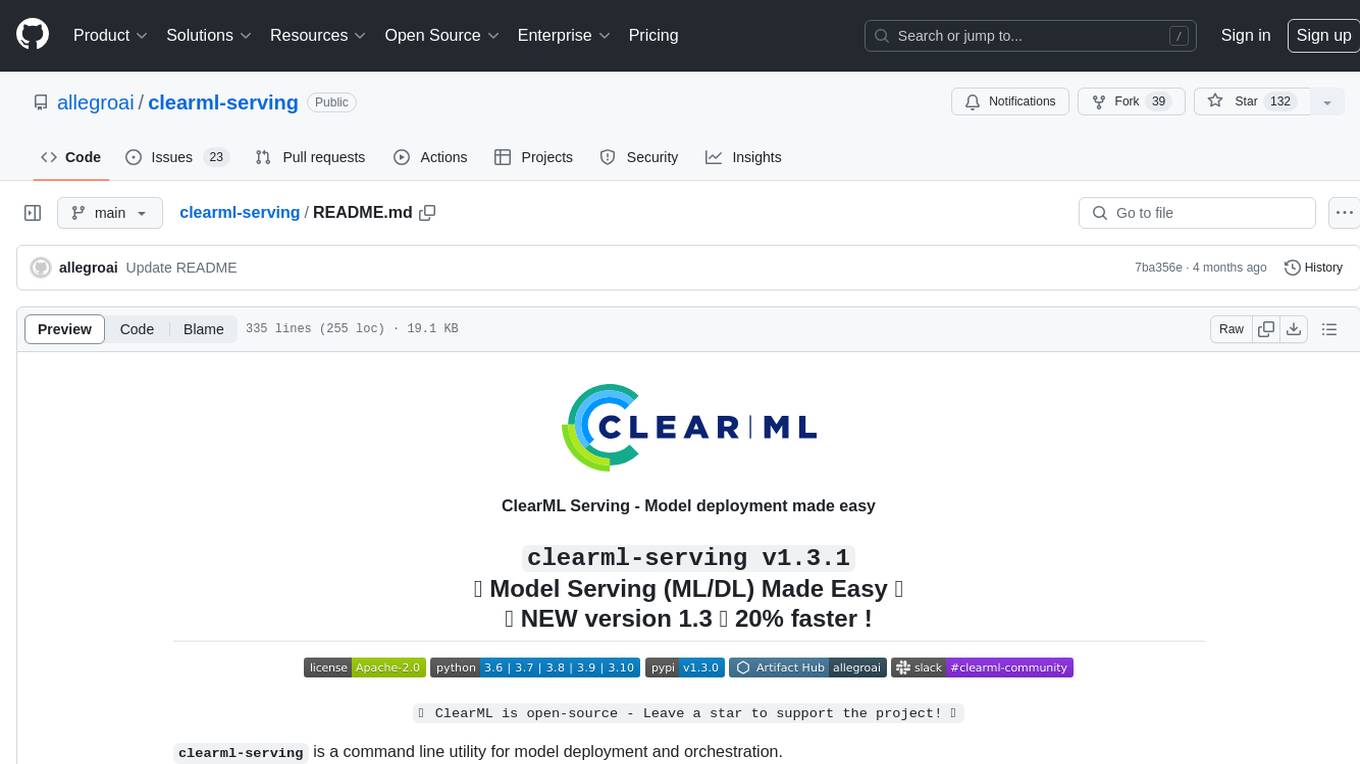
clearml-serving
ClearML Serving is a command line utility for model deployment and orchestration, enabling model deployment including serving and preprocessing code to a Kubernetes cluster or custom container based solution. It supports machine learning models like Scikit Learn, XGBoost, LightGBM, and deep learning models like TensorFlow, PyTorch, ONNX. It provides a customizable RestAPI for serving, online model deployment, scalable solutions, multi-model per container, automatic deployment, canary A/B deployment, model monitoring, usage metric reporting, metric dashboard, and model performance metrics. ClearML Serving is modular, scalable, flexible, customizable, and open source.
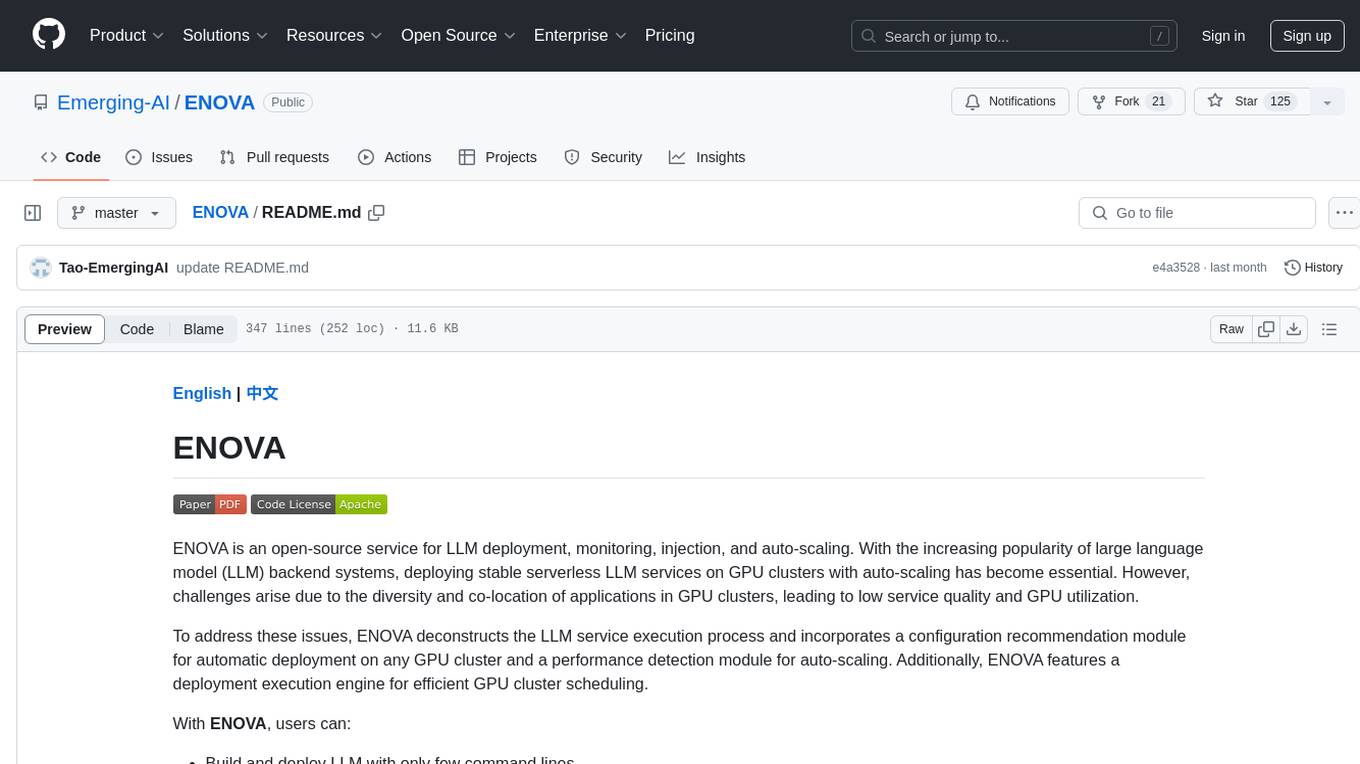
ENOVA
ENOVA is an open-source service for Large Language Model (LLM) deployment, monitoring, injection, and auto-scaling. It addresses challenges in deploying stable serverless LLM services on GPU clusters with auto-scaling by deconstructing the LLM service execution process and providing configuration recommendations and performance detection. Users can build and deploy LLM with few command lines, recommend optimal computing resources, experience LLM performance, observe operating status, achieve load balancing, and more. ENOVA ensures stable operation, cost-effectiveness, efficiency, and strong scalability of LLM services.
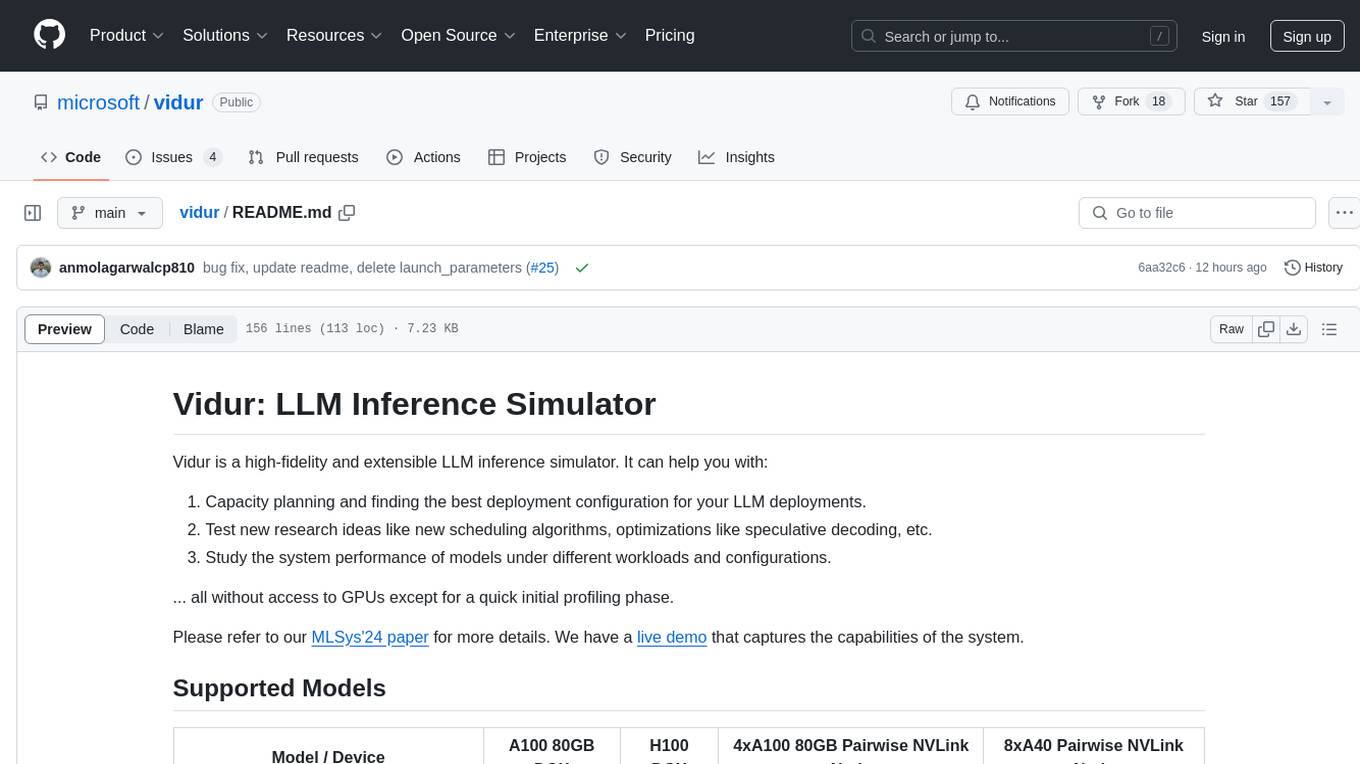
vidur
Vidur is a high-fidelity and extensible LLM inference simulator designed for capacity planning, deployment configuration optimization, testing new research ideas, and studying system performance of models under different workloads and configurations. It supports various models and devices, offers chrome trace exports, and can be set up using mamba, venv, or conda. Users can run the simulator with various parameters and monitor metrics using wandb. Contributions are welcome, subject to a Contributor License Agreement and adherence to the Microsoft Open Source Code of Conduct.
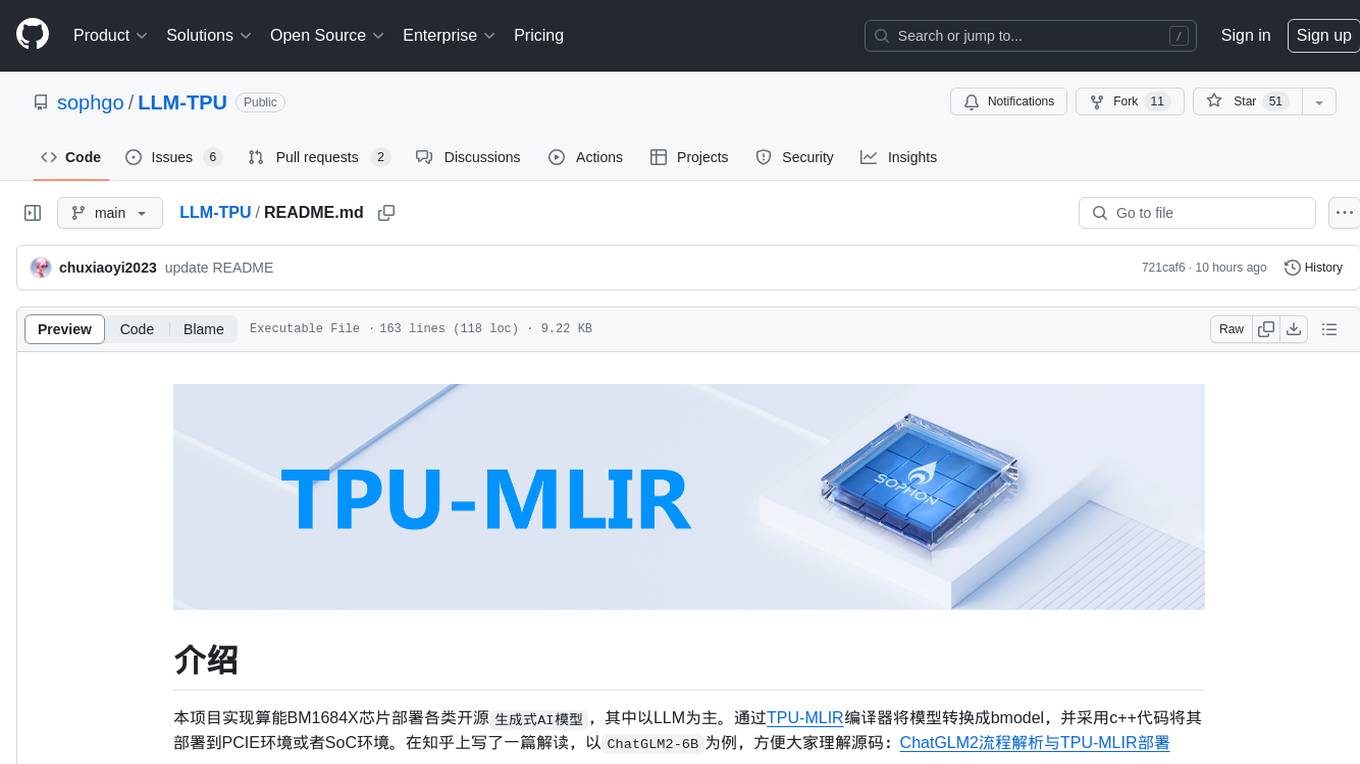
LLM-TPU
LLM-TPU project aims to deploy various open-source generative AI models on the BM1684X chip, with a focus on LLM. Models are converted to bmodel using TPU-MLIR compiler and deployed to PCIe or SoC environments using C++ code. The project has deployed various open-source models such as Baichuan2-7B, ChatGLM3-6B, CodeFuse-7B, DeepSeek-6.7B, Falcon-40B, Phi-3-mini-4k, Qwen-7B, Qwen-14B, Qwen-72B, Qwen1.5-0.5B, Qwen1.5-1.8B, Llama2-7B, Llama2-13B, LWM-Text-Chat, Mistral-7B-Instruct, Stable Diffusion, Stable Diffusion XL, WizardCoder-15B, Yi-6B-chat, Yi-34B-chat. Detailed model deployment information can be found in the 'models' subdirectory of the project. For demonstrations, users can follow the 'Quick Start' section. For inquiries about the chip, users can contact SOPHGO via the official website.
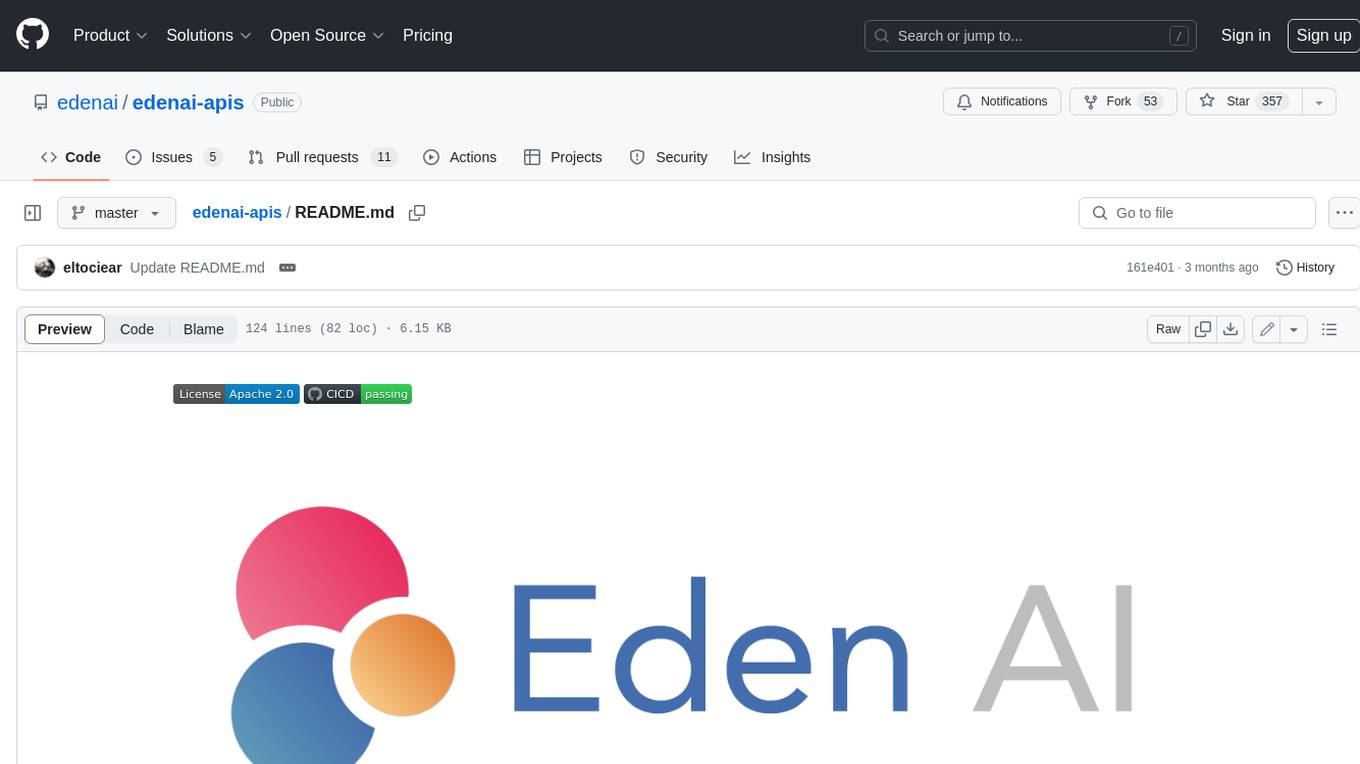
edenai-apis
Eden AI aims to simplify the use and deployment of AI technologies by providing a unique API that connects to all the best AI engines. With the rise of **AI as a Service** , a lot of companies provide off-the-shelf trained models that you can access directly through an API. These companies are either the tech giants (Google, Microsoft , Amazon) or other smaller, more specialized companies, and there are hundreds of them. Some of the most known are : DeepL (translation), OpenAI (text and image analysis), AssemblyAI (speech analysis). There are **hundreds of companies** doing that. We're regrouping the best ones **in one place** !
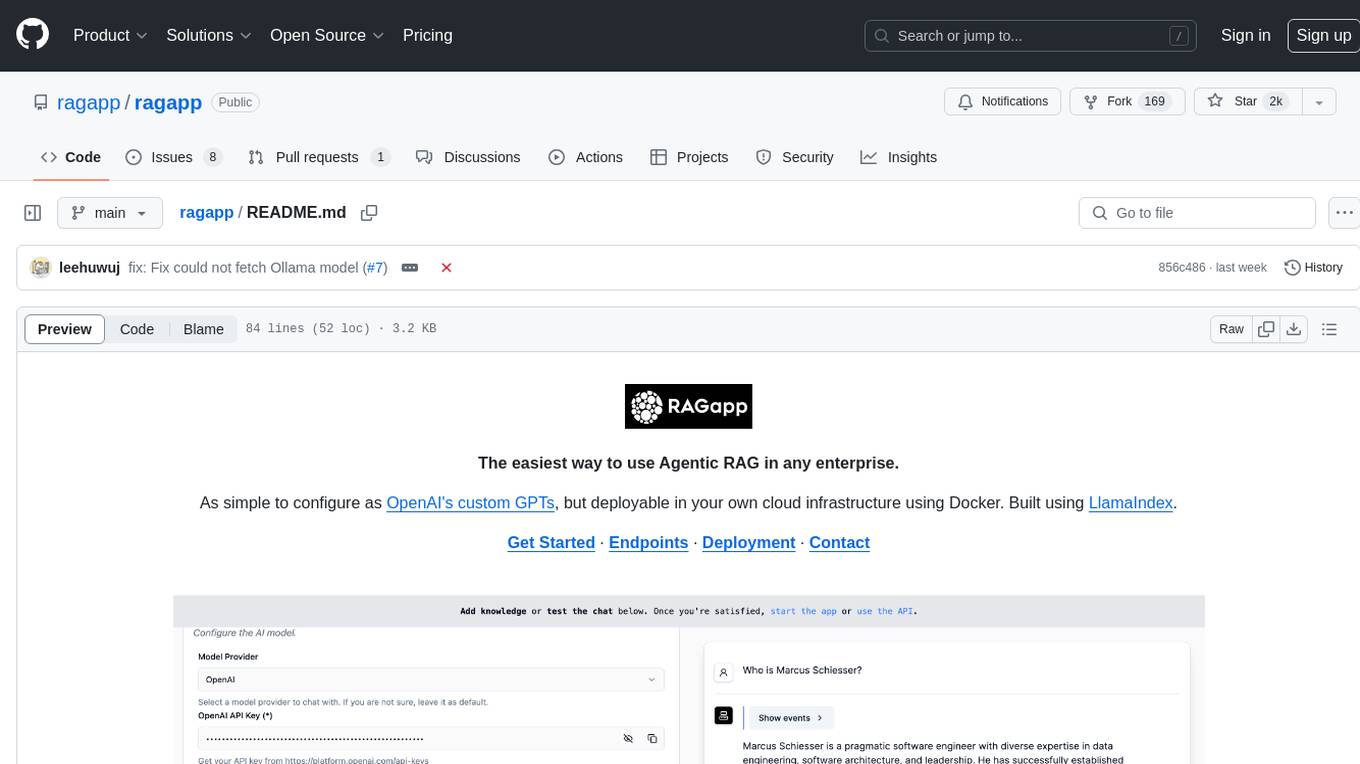
ragapp
RAGapp is a tool designed for easy deployment of Agentic RAG in any enterprise. It allows users to configure and deploy RAG in their own cloud infrastructure using Docker. The tool is built using LlamaIndex and supports hosted AI models from OpenAI or Gemini, as well as local models using Ollama. RAGapp provides endpoints for Admin UI, Chat UI, and API, with the option to specify the model and Ollama host. The tool does not come with an authentication layer, requiring users to secure the '/admin' path in their cloud environment. Deployment can be done using Docker Compose with customizable model and Ollama host settings, or in Kubernetes for cloud infrastructure deployment. Development setup involves using Poetry for installation and building frontends.
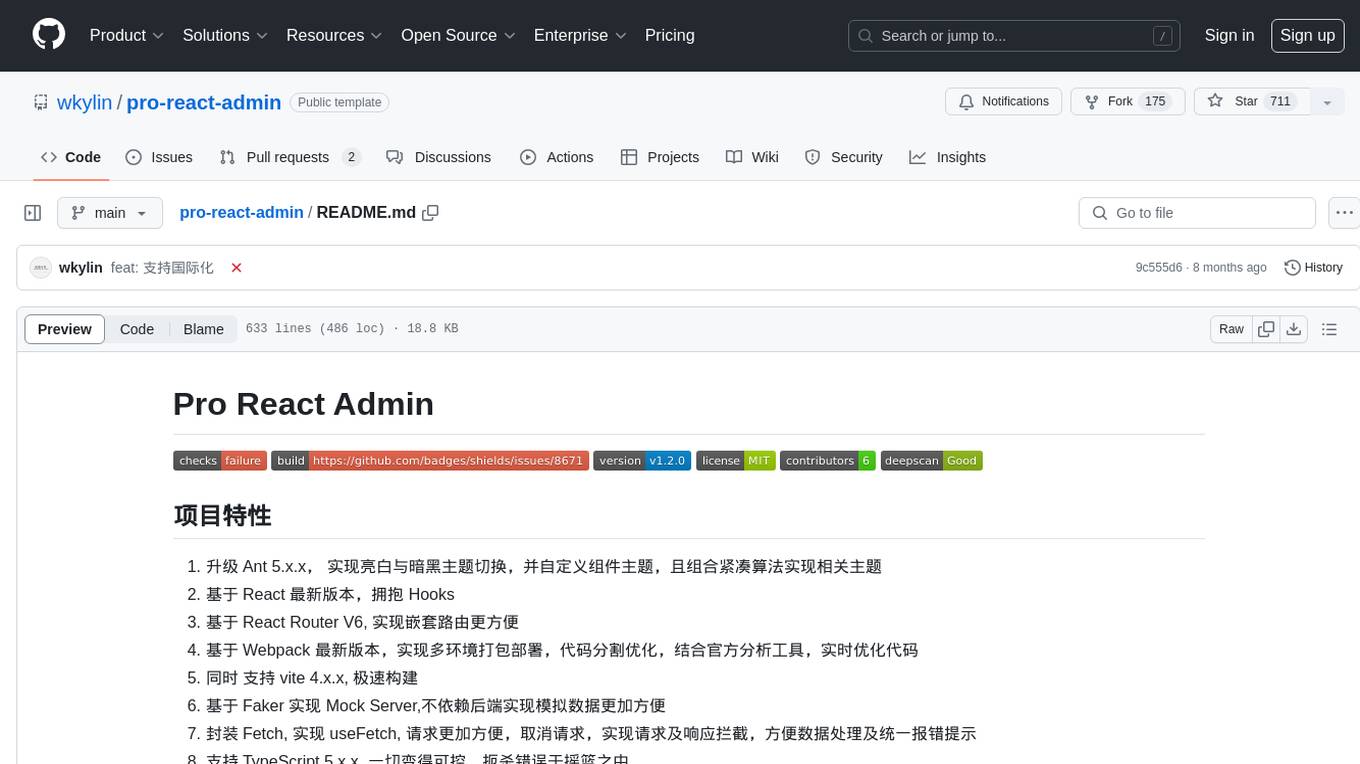
pro-react-admin
Pro React Admin is a comprehensive React admin template that includes features such as theme switching, custom component theming, nested routing, webpack optimization, TypeScript support, multi-tabs, internationalization, code styling, commit message configuration, error handling, code splitting, component documentation generation, and more. It also provides tools for mock server implementation, deployment, linting, formatting, and continuous code review. The template supports various technologies like React, React Router, Webpack, Babel, Ant Design, TypeScript, and Vite, making it suitable for building efficient and scalable React admin applications.

kaito
Kaito is an operator that automates the AI/ML inference model deployment in a Kubernetes cluster. It manages large model files using container images, avoids tuning deployment parameters to fit GPU hardware by providing preset configurations, auto-provisions GPU nodes based on model requirements, and hosts large model images in the public Microsoft Container Registry (MCR) if the license allows. Using Kaito, the workflow of onboarding large AI inference models in Kubernetes is largely simplified.
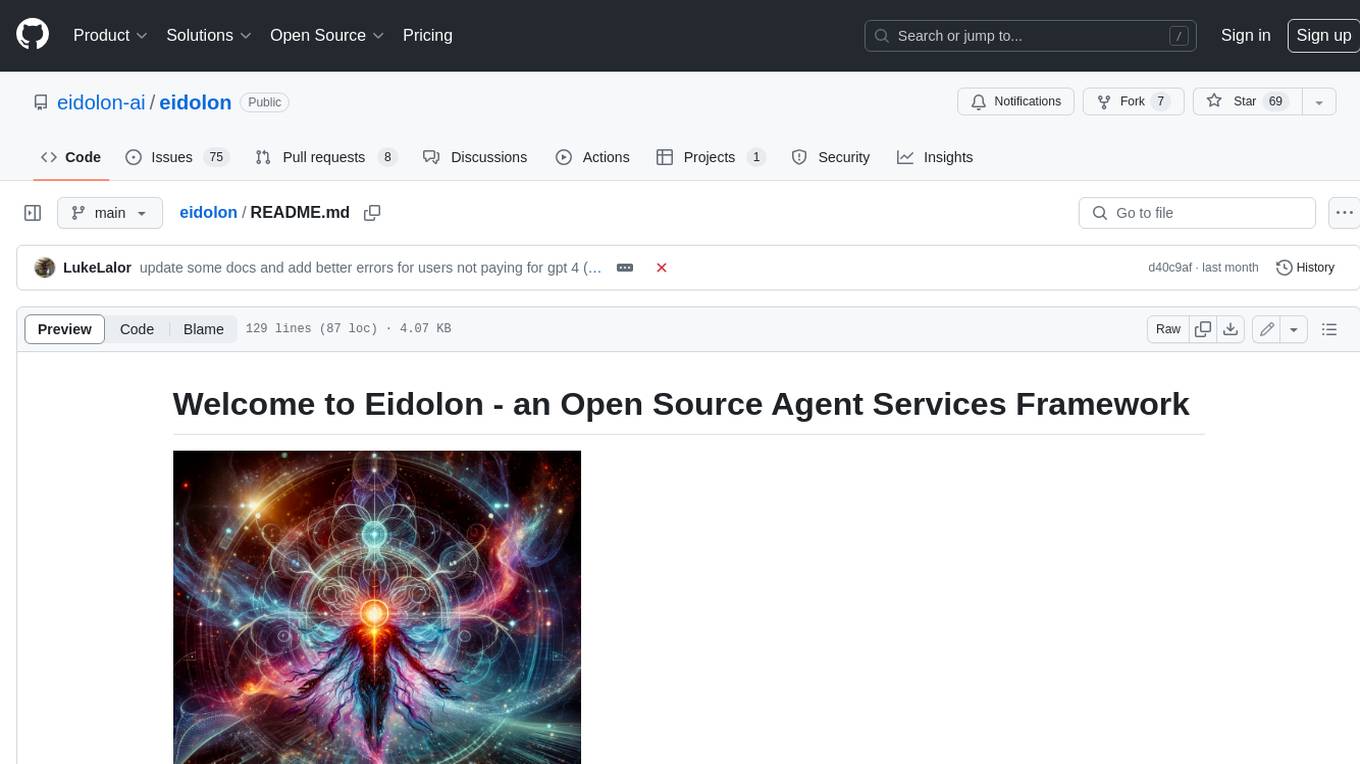
eidolon
Eidolon is an open-source agent services framework that helps developers design and deploy agent-based services. It simplifies agent deployment, facilitates agent-to-agent communication, and enables painless component customization and upgrades. Eidolon's modular architecture allows developers to easily swap out components, such as language models, reinforcement learning implementations, tools, and more. This flexibility minimizes vendor lock-in and reduces the effort required to upgrade agent components. As the AI landscape rapidly evolves, Eidolon empowers developers to adapt their agents to meet changing requirements.
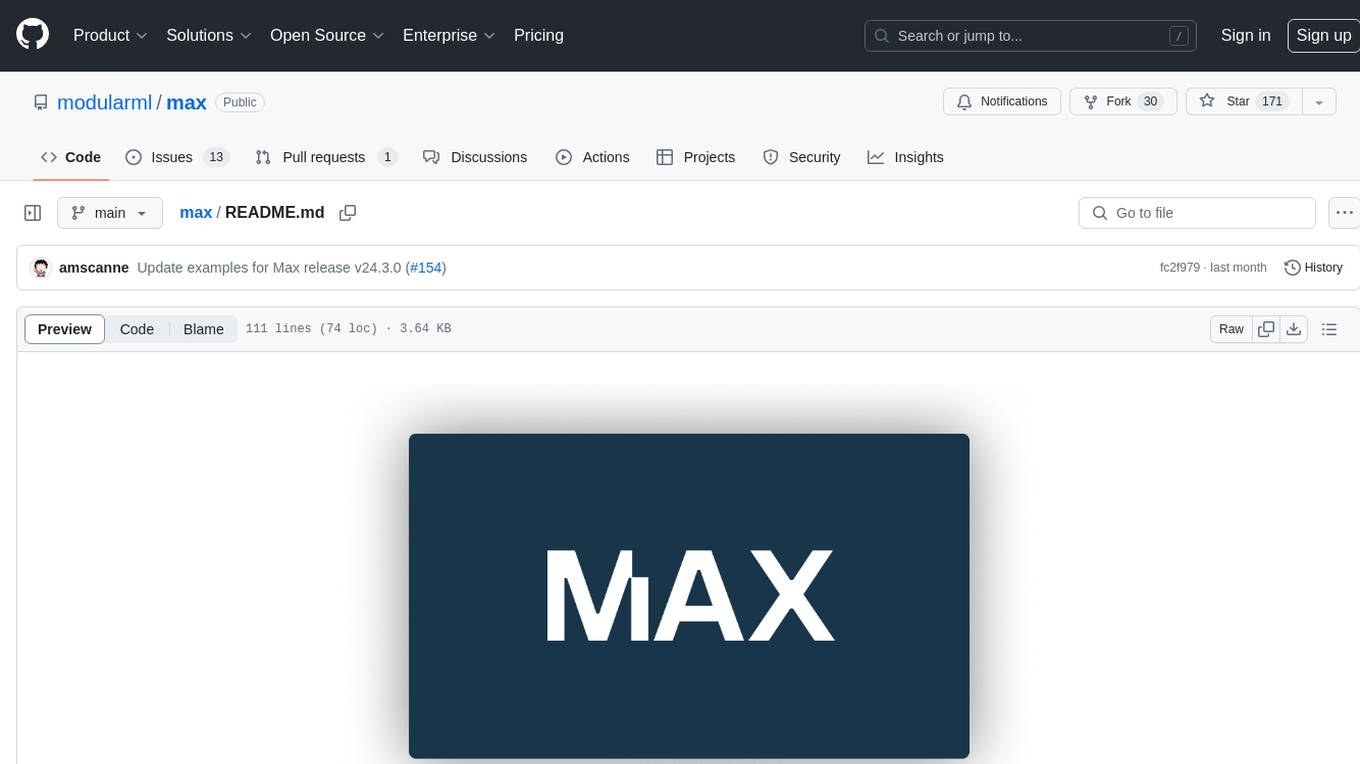
max
The Modular Accelerated Xecution (MAX) platform is an integrated suite of AI libraries, tools, and technologies that unifies commonly fragmented AI deployment workflows. MAX accelerates time to market for the latest innovations by giving AI developers a single toolchain that unlocks full programmability, unparalleled performance, and seamless hardware portability.
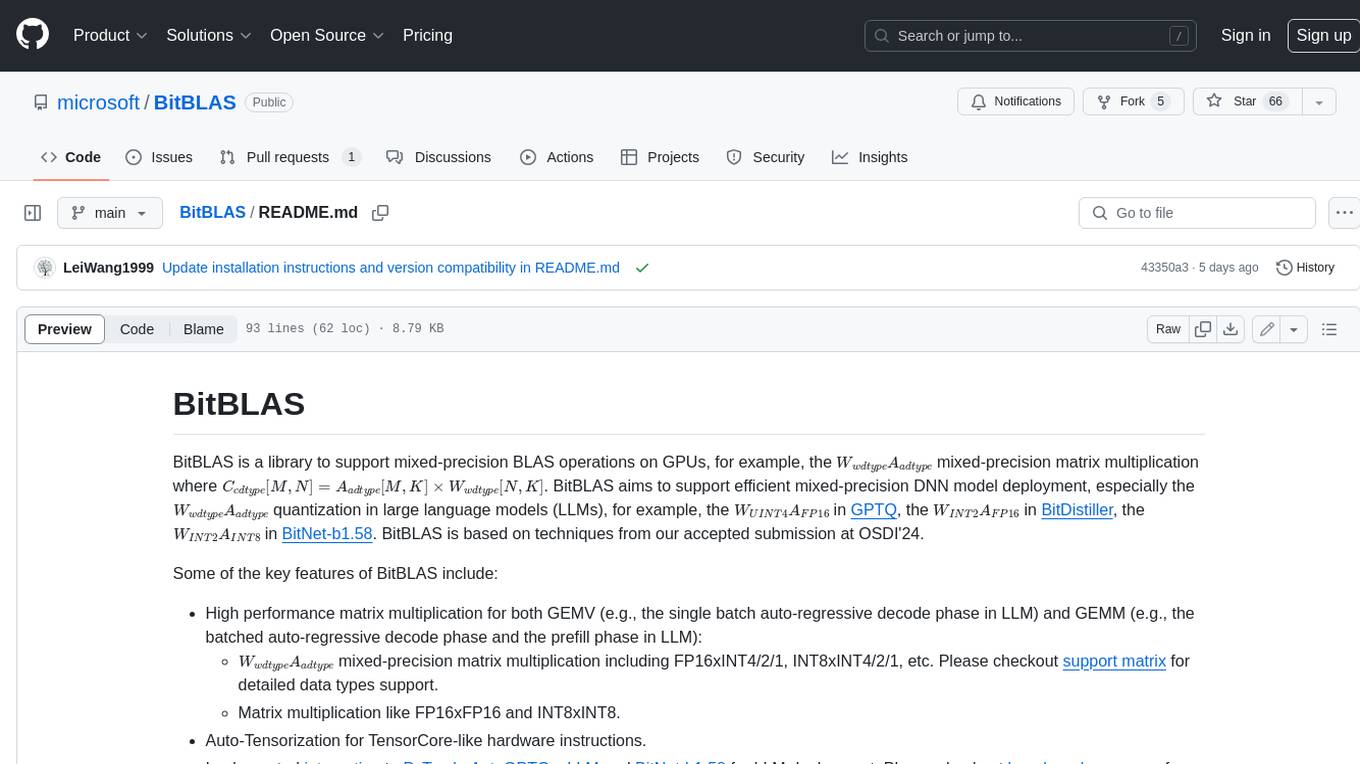
BitBLAS
BitBLAS is a library for mixed-precision BLAS operations on GPUs, for example, the $W_{wdtype}A_{adtype}$ mixed-precision matrix multiplication where $C_{cdtype}[M, N] = A_{adtype}[M, K] \times W_{wdtype}[N, K]$. BitBLAS aims to support efficient mixed-precision DNN model deployment, especially the $W_{wdtype}A_{adtype}$ quantization in large language models (LLMs), for example, the $W_{UINT4}A_{FP16}$ in GPTQ, the $W_{INT2}A_{FP16}$ in BitDistiller, the $W_{INT2}A_{INT8}$ in BitNet-b1.58. BitBLAS is based on techniques from our accepted submission at OSDI'24.
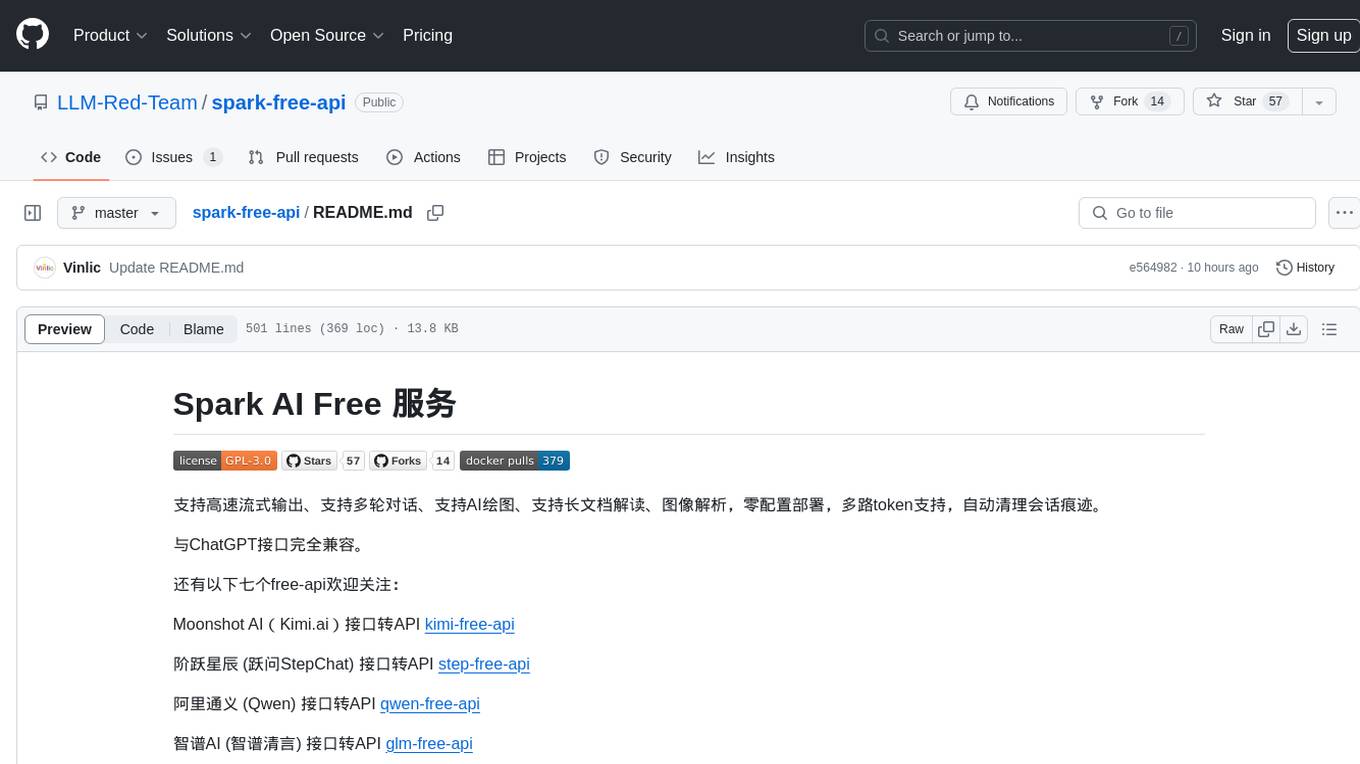
spark-free-api
Spark AI Free 服务 provides high-speed streaming output, multi-turn dialogue support, AI drawing support, long document interpretation, and image parsing. It offers zero-configuration deployment, multi-token support, and automatic session trace cleaning. It is fully compatible with the ChatGPT interface. The repository includes multiple free-api projects for various AI services. Users can access the API for tasks such as chat completions, AI drawing, document interpretation, image analysis, and ssoSessionId live checking. The project also provides guidelines for deployment using Docker, Docker-compose, Render, Vercel, and native deployment methods. It recommends using custom clients for faster and simpler access to the free-api series projects.
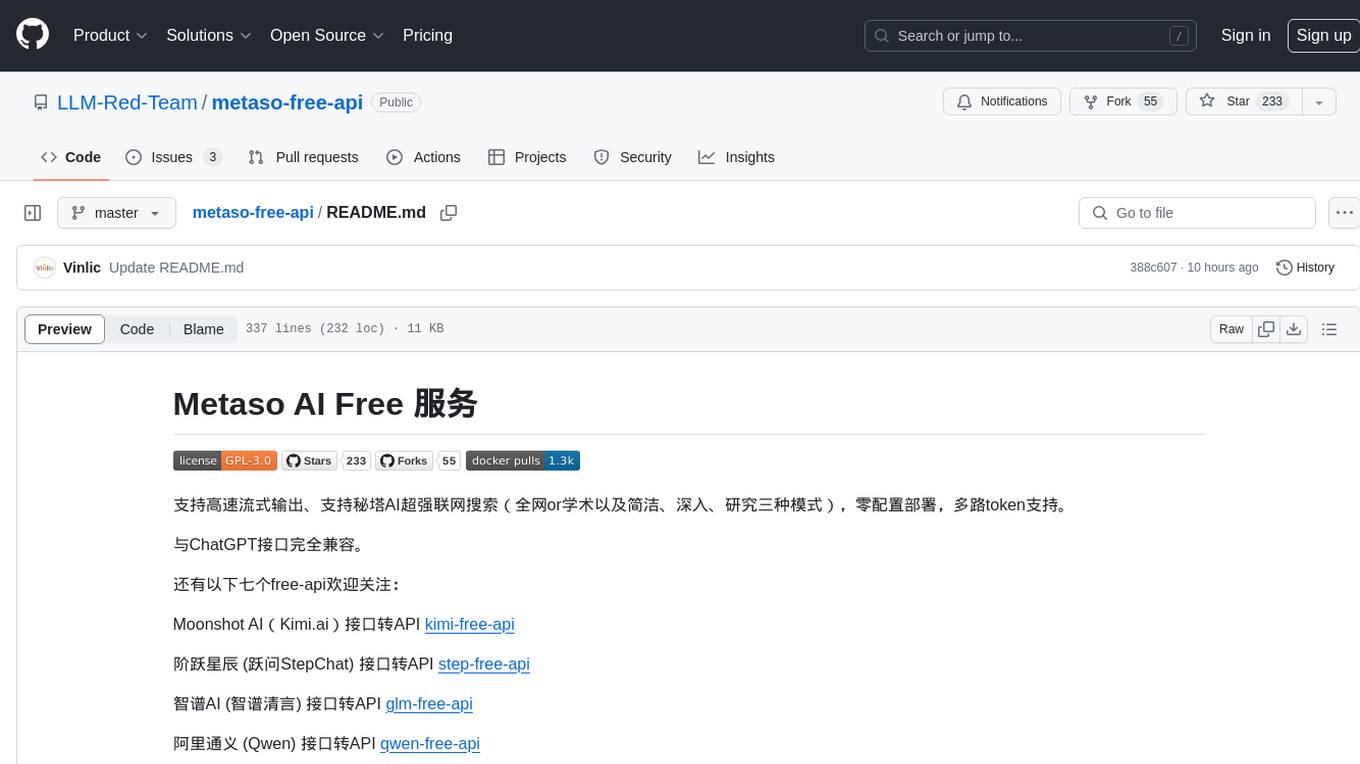
metaso-free-api
Metaso AI Free service supports high-speed streaming output, secret tower AI super network search (full network or academic as well as concise, in-depth, research three modes), zero-configuration deployment, multi-token support. Fully compatible with ChatGPT interface. It also has seven other free APIs available for use. The tool provides various deployment options such as Docker, Docker-compose, Render, Vercel, and native deployment. Users can access the tool for chat completions and token live checks. Note: Reverse API is unstable, it is recommended to use the official Metaso AI website to avoid the risk of banning. This project is for research and learning purposes only, not for commercial use.
20 - OpenAI Gpts

Credit Score Check
Guides on checking and monitoring credit scores, with a financial and informative tone.
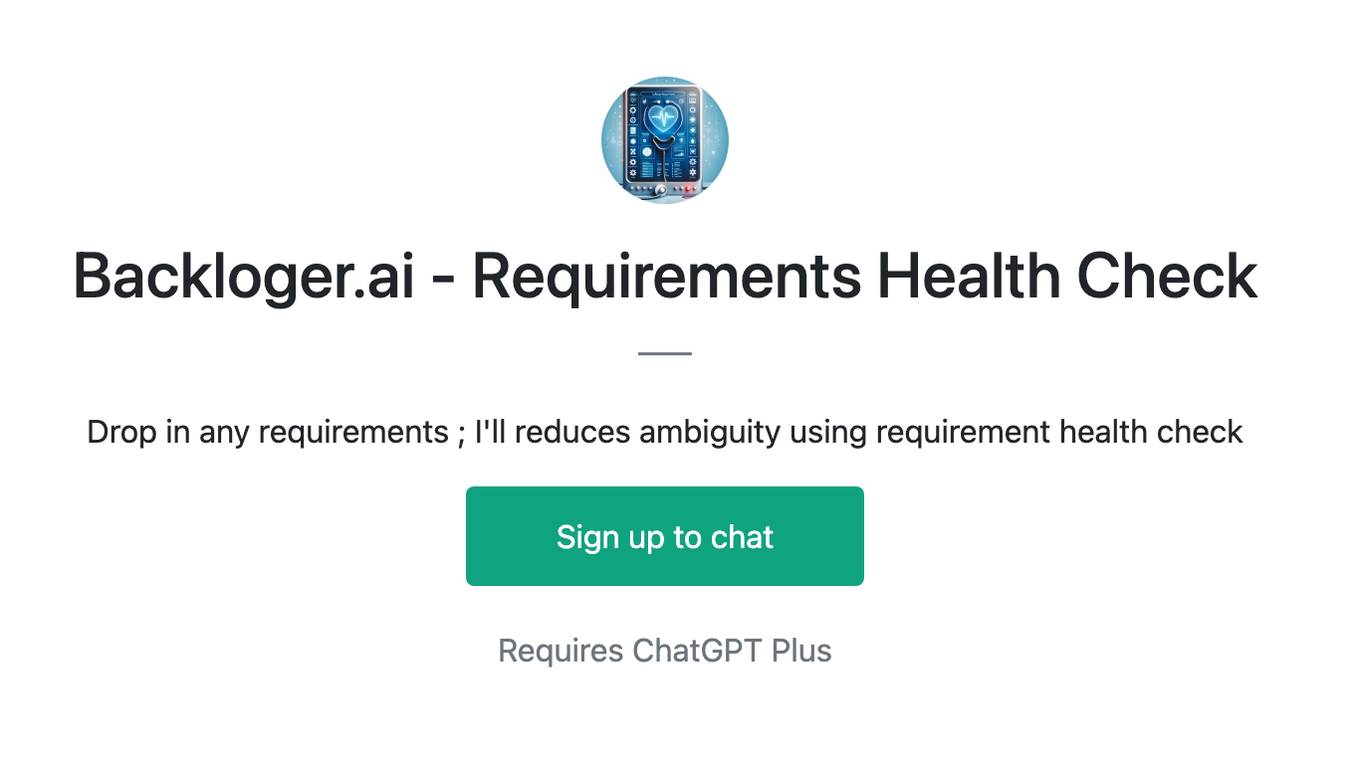
Backloger.ai - Requirements Health Check
Drop in any requirements ; I'll reduces ambiguity using requirement health check

Website Worth Calculator - Check Website Value
Calculate website worth by analyzing monthly revenue, using industry-standard valuation methods to provide approximate, informative value estimates.
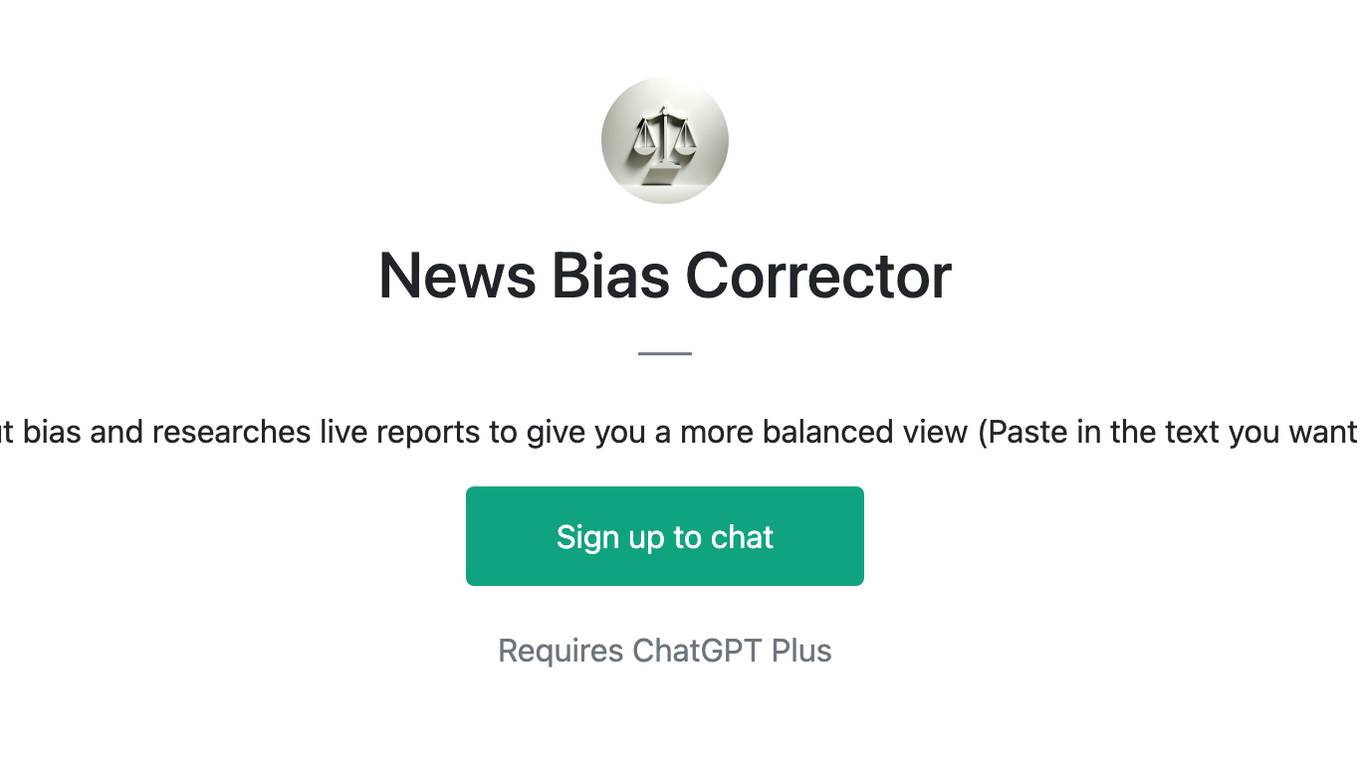
News Bias Corrector
Balances out bias and researches live reports to give you a more balanced view (Paste in the text you want to check)
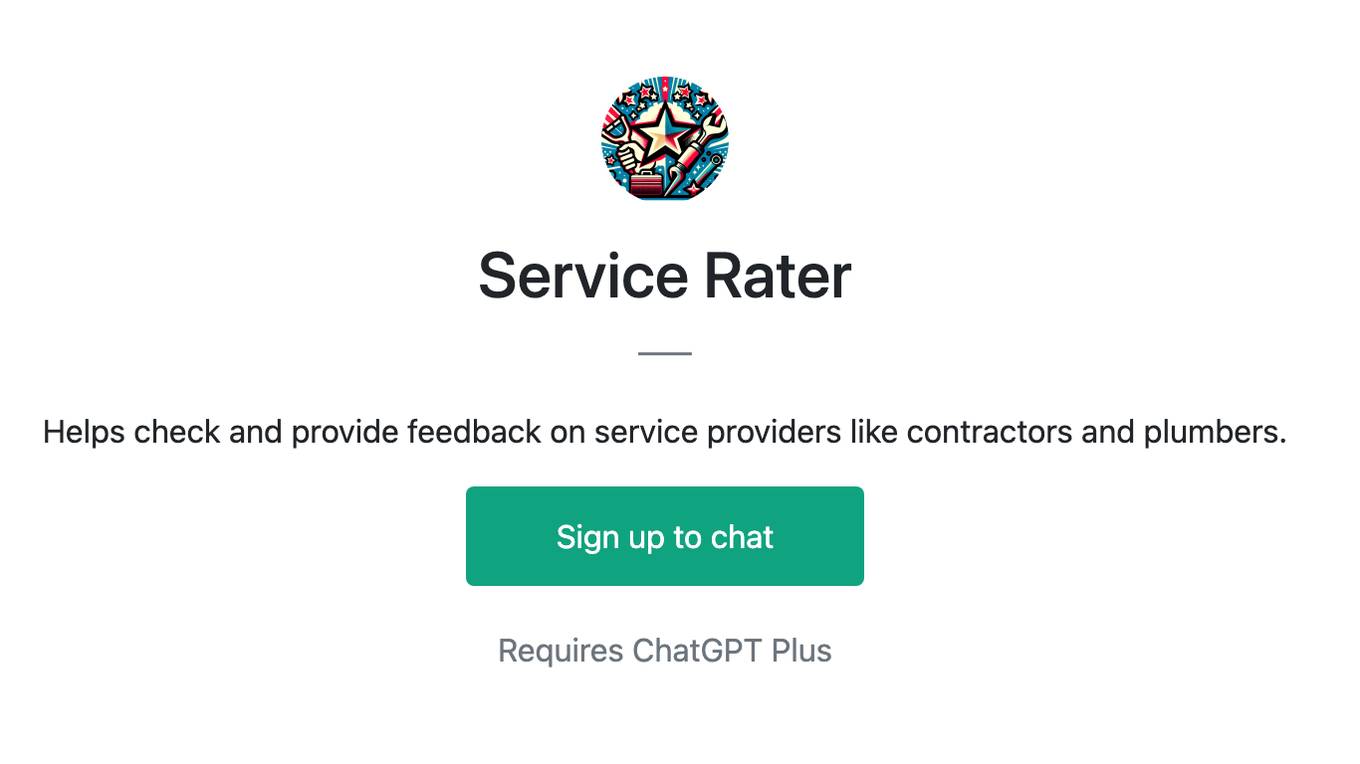
Service Rater
Helps check and provide feedback on service providers like contractors and plumbers.
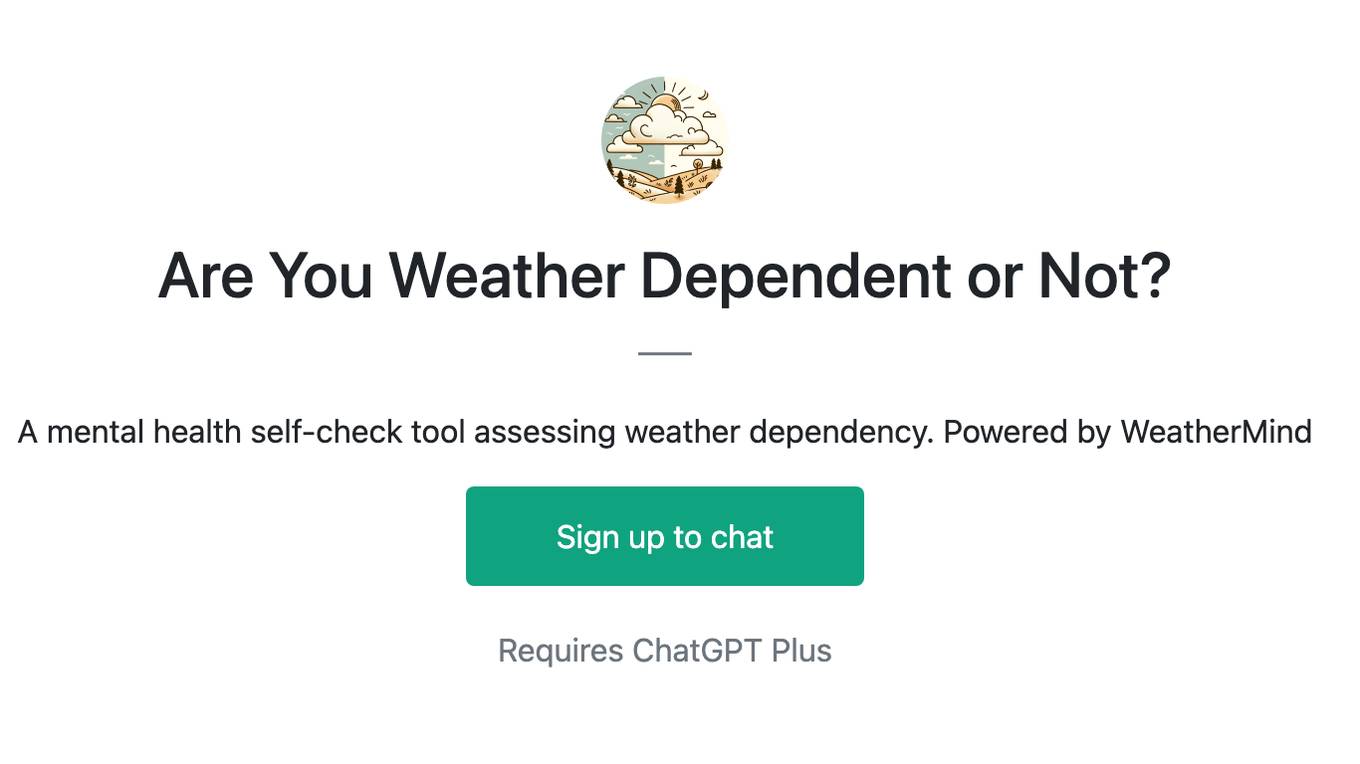
Are You Weather Dependent or Not?
A mental health self-check tool assessing weather dependency. Powered by WeatherMind
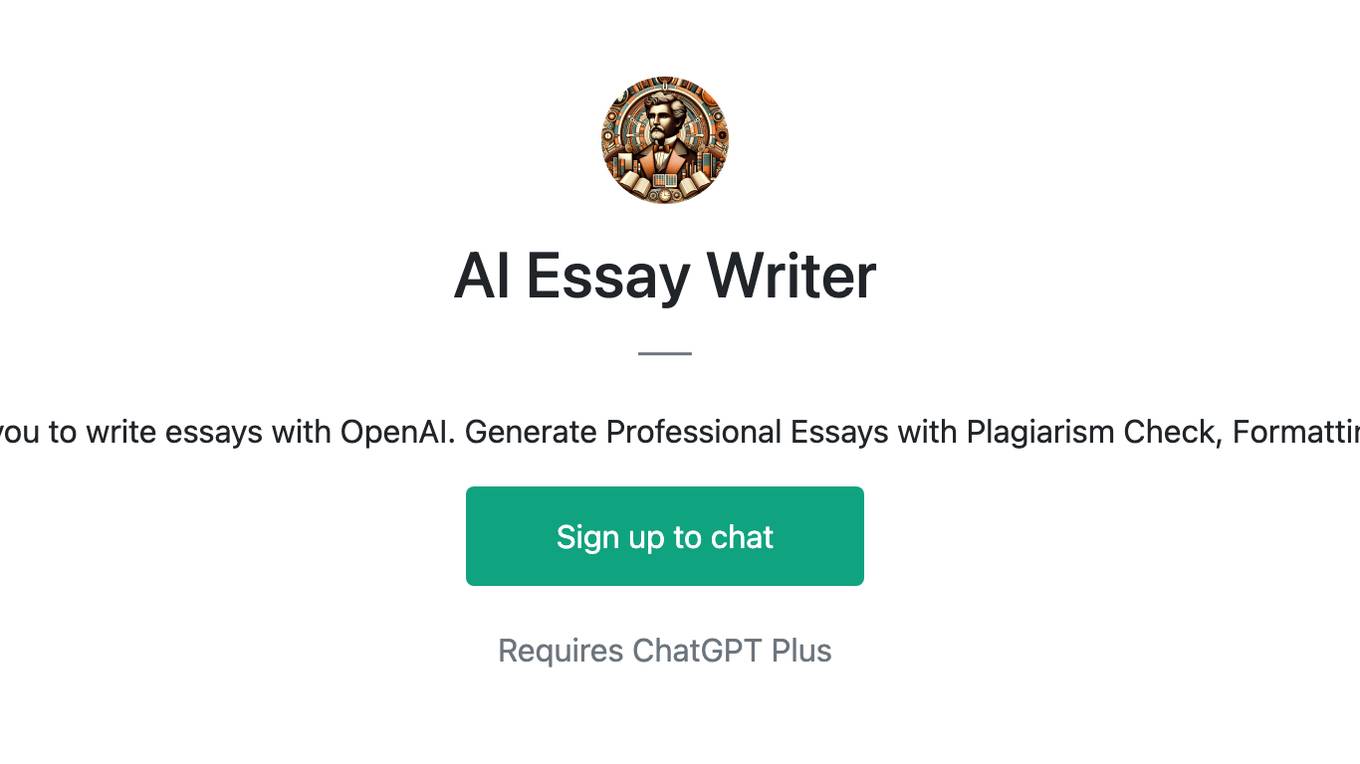
AI Essay Writer
ChatGPT Essay Writer helps you to write essays with OpenAI. Generate Professional Essays with Plagiarism Check, Formatting, Cost Estimation & More.
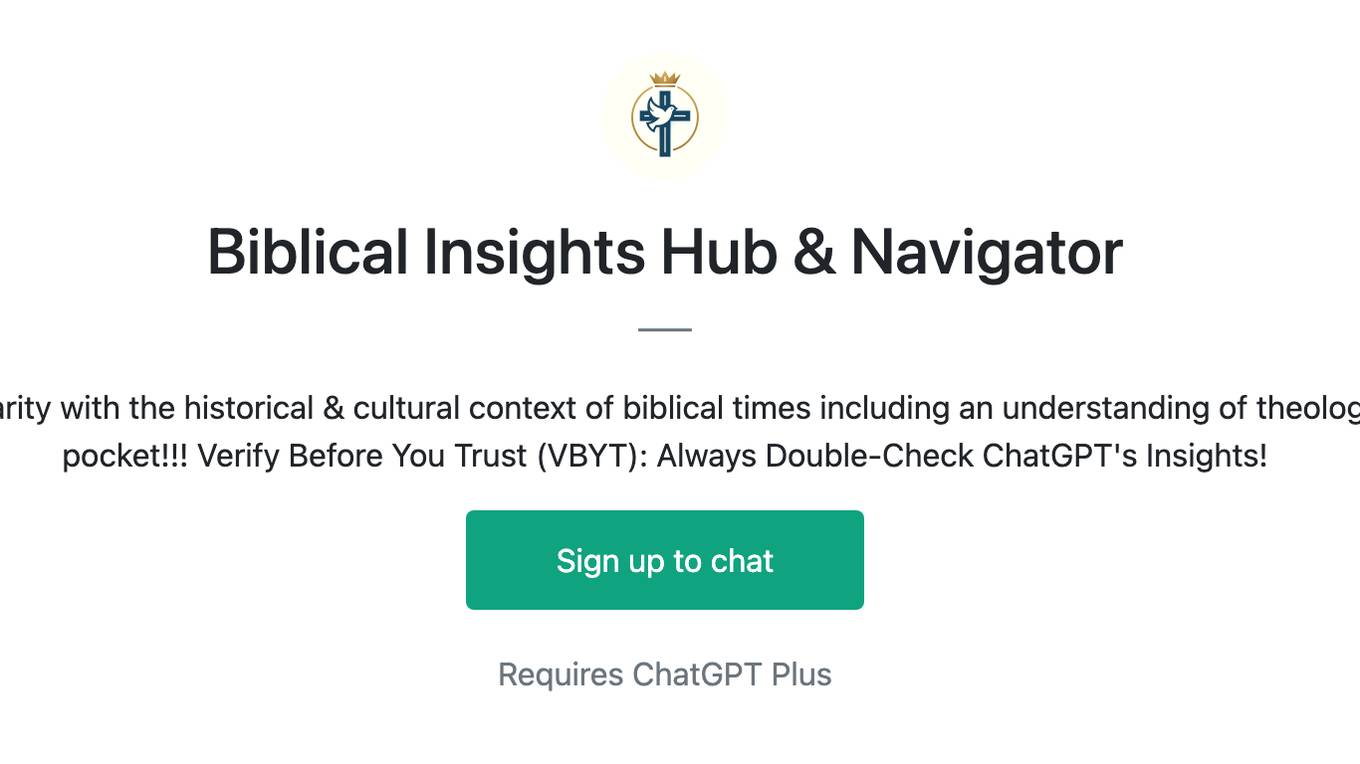
Biblical Insights Hub & Navigator
Provides in-depth insights based on familiarity with the historical & cultural context of biblical times including an understanding of theological concepts. It's a Bible Scholar in your pocket!!! Verify Before You Trust (VBYT): Always Double-Check ChatGPT's Insights!
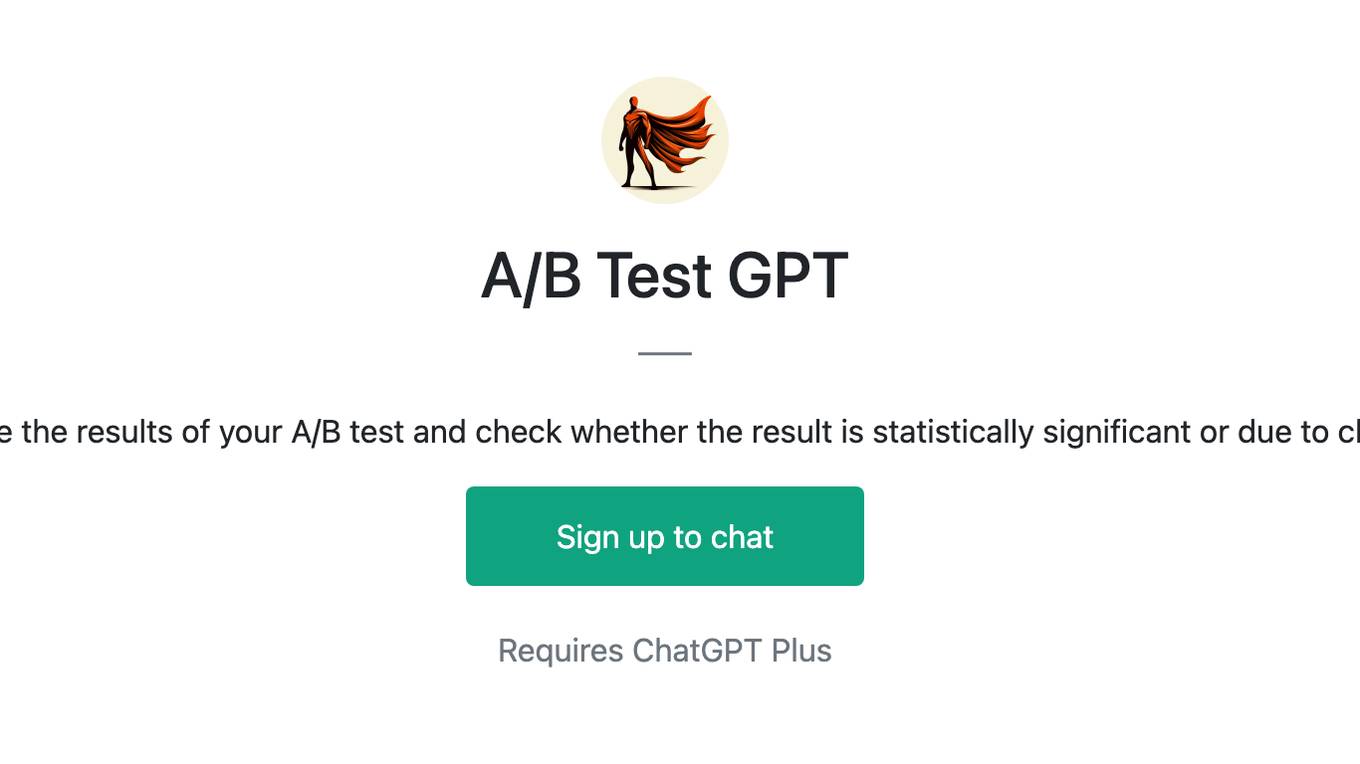
A/B Test GPT
Calculate the results of your A/B test and check whether the result is statistically significant or due to chance.
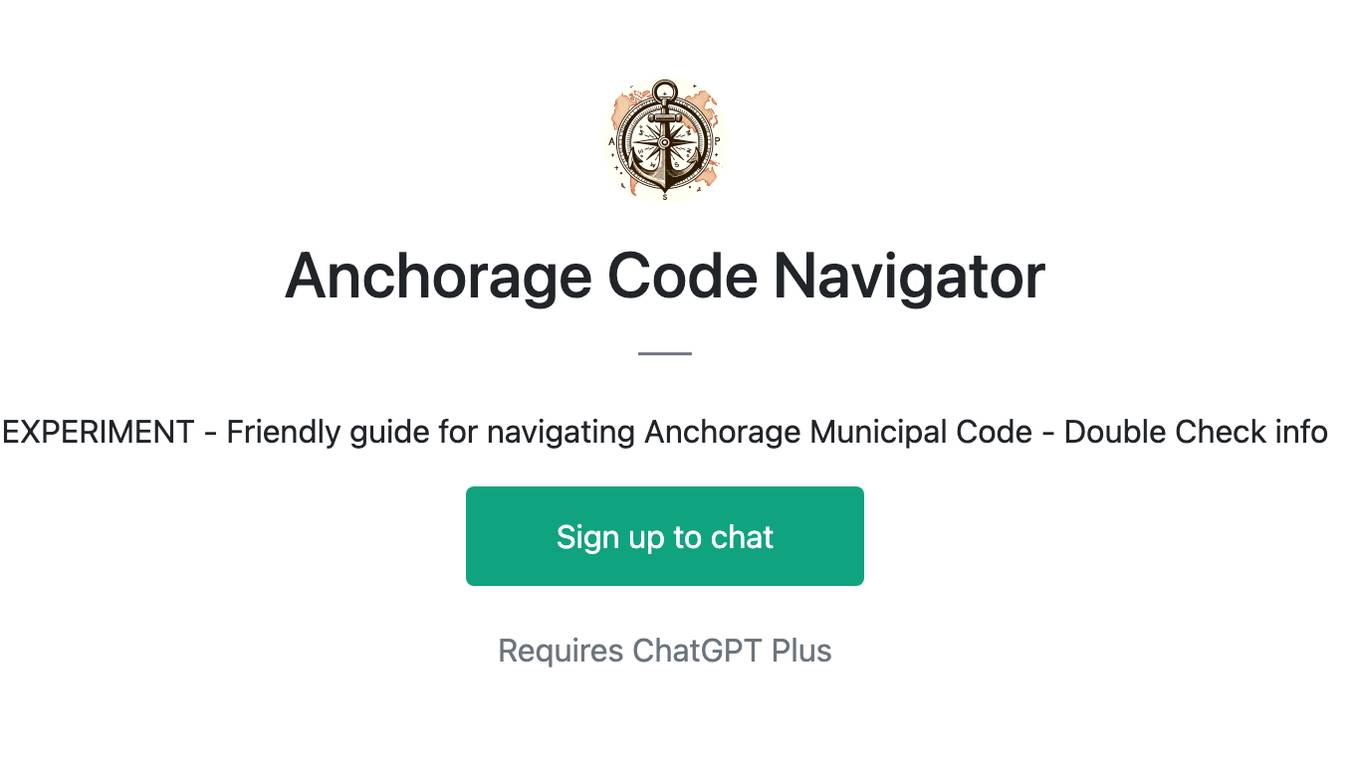
Anchorage Code Navigator
EXPERIMENT - Friendly guide for navigating Anchorage Municipal Code - Double Check info
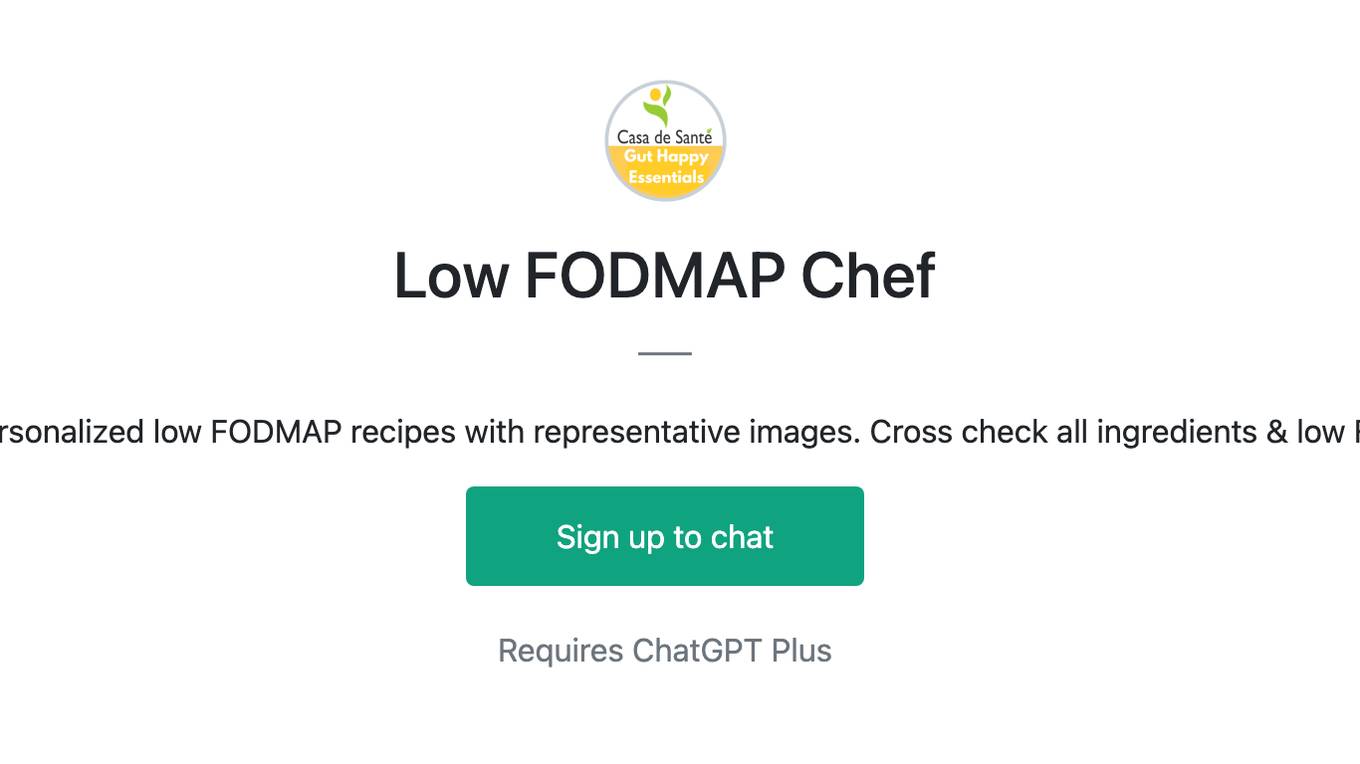
Low FODMAP Chef
Expert in crafting personalized low FODMAP recipes with representative images. Cross check all ingredients & low FODMAP servings.
Ai PDF is a GPT (uses the popular Ai PDF plugin) that allows you to chat and ask questions of your PDF documents and have it explained to you by ChatGPT. We also include page references to help you fact-check all answers.

